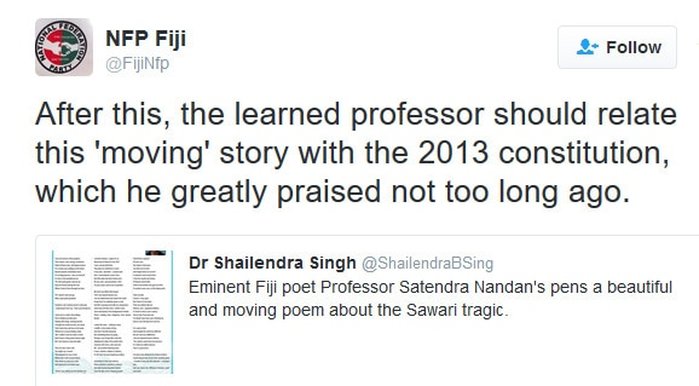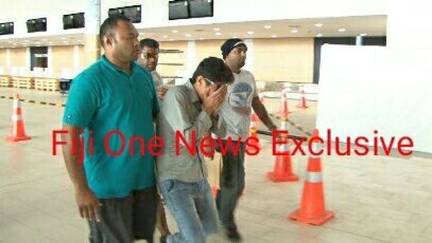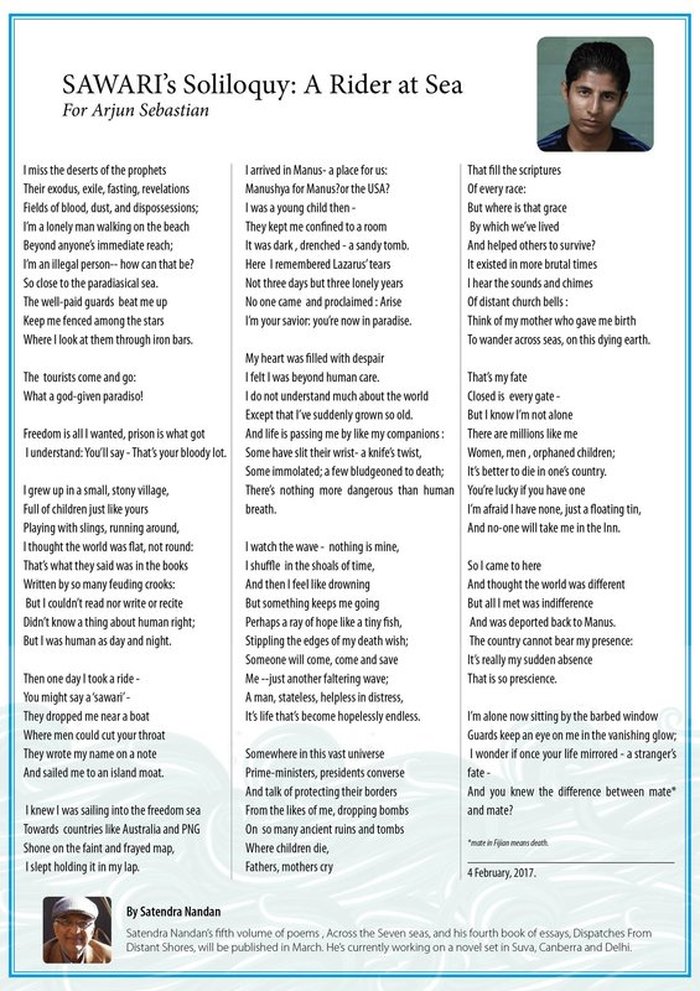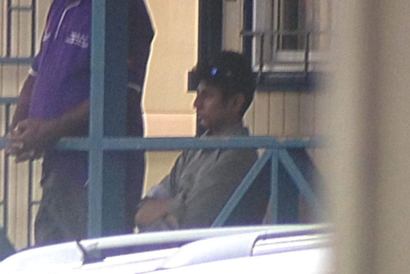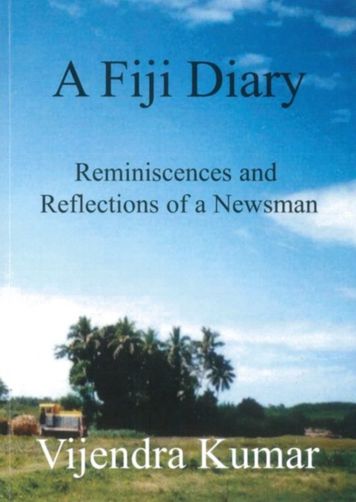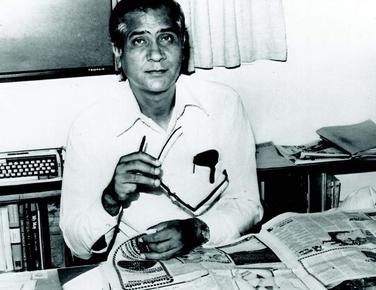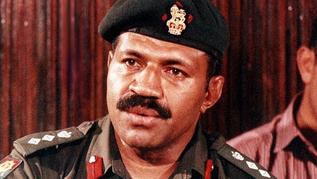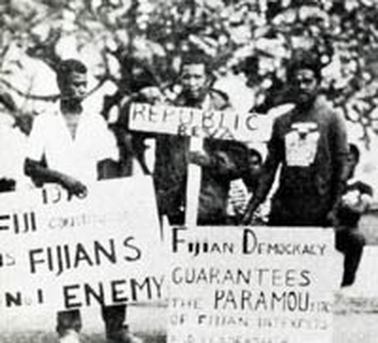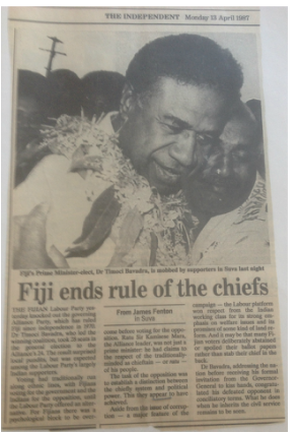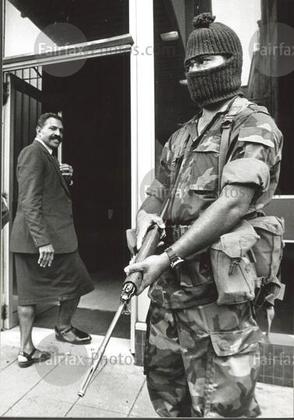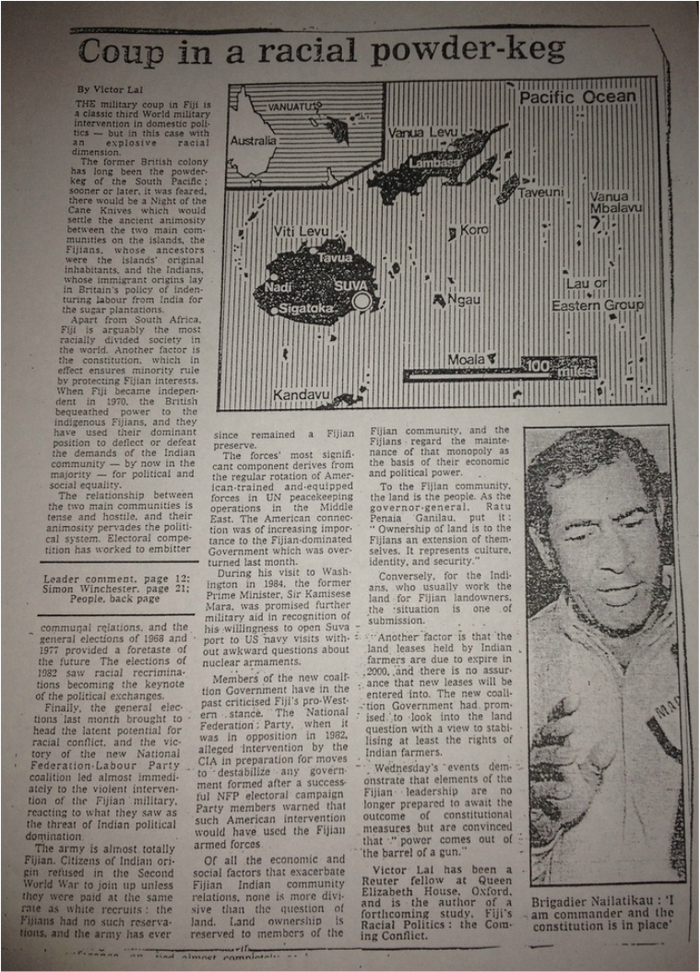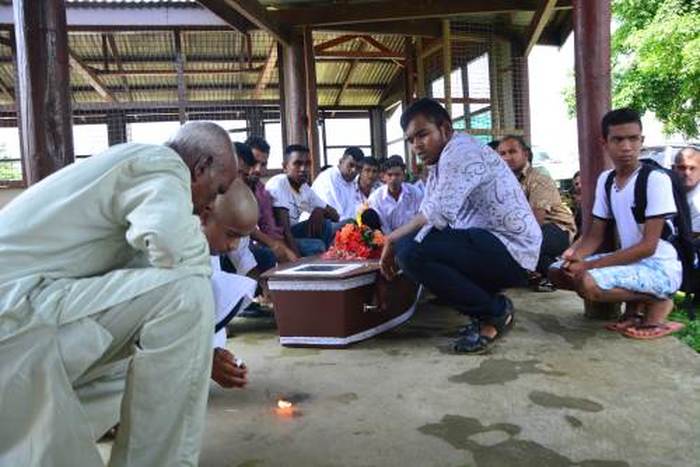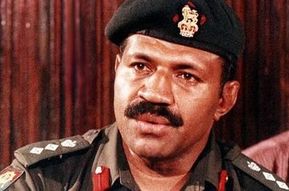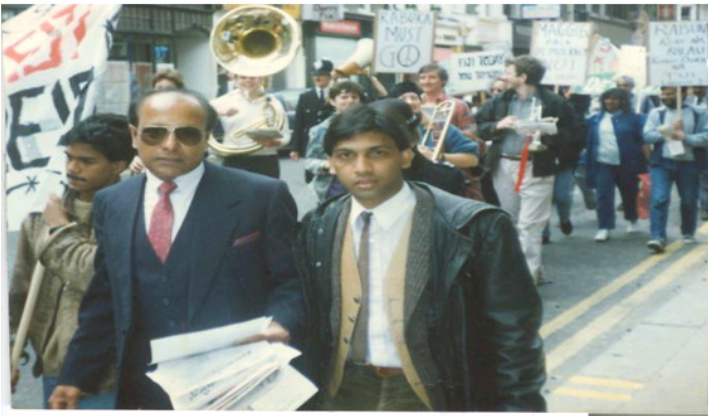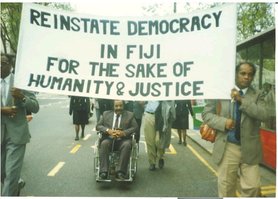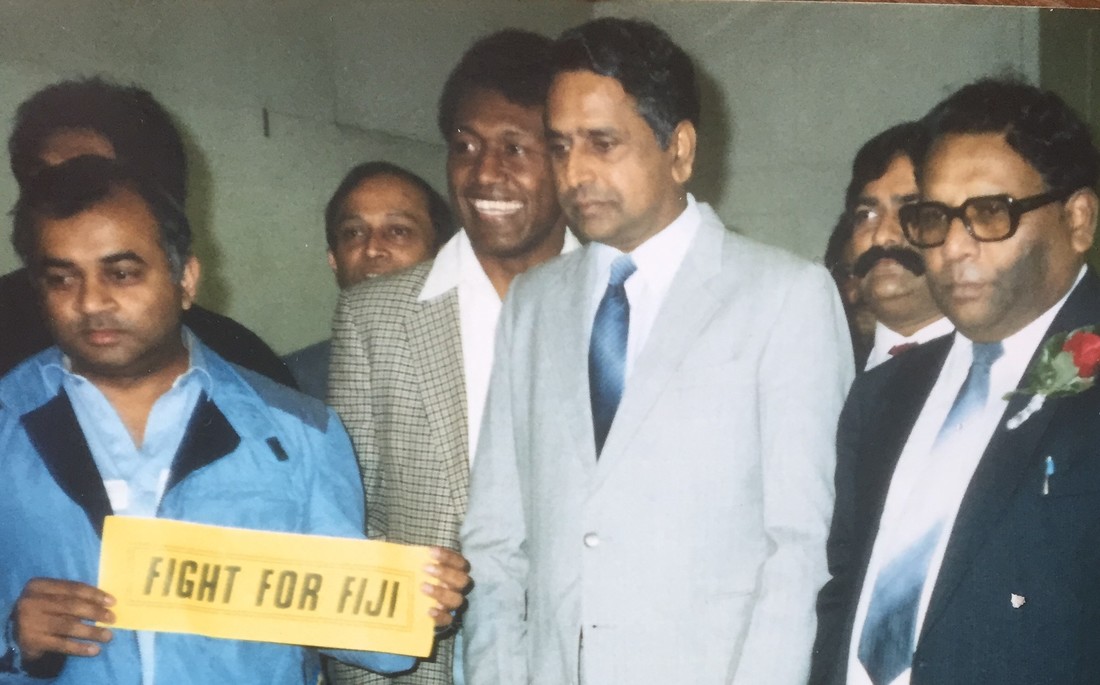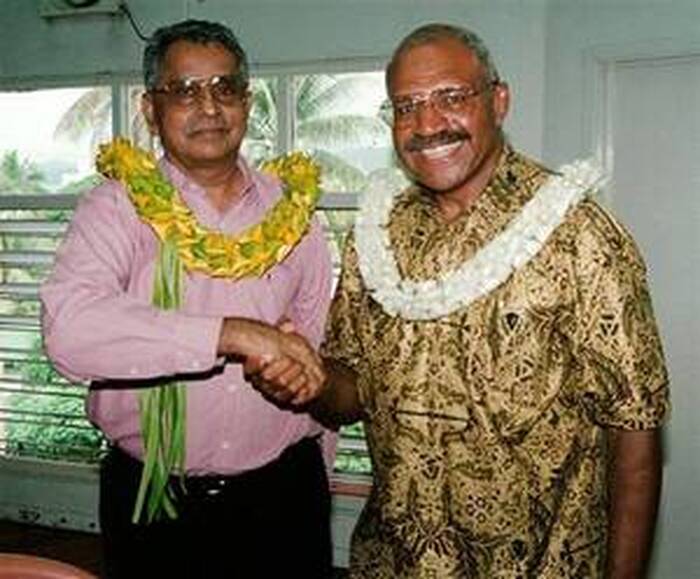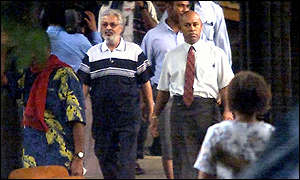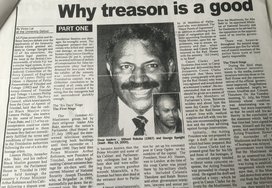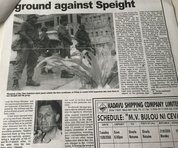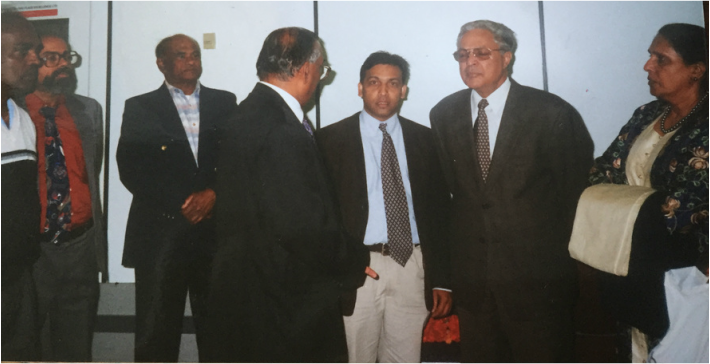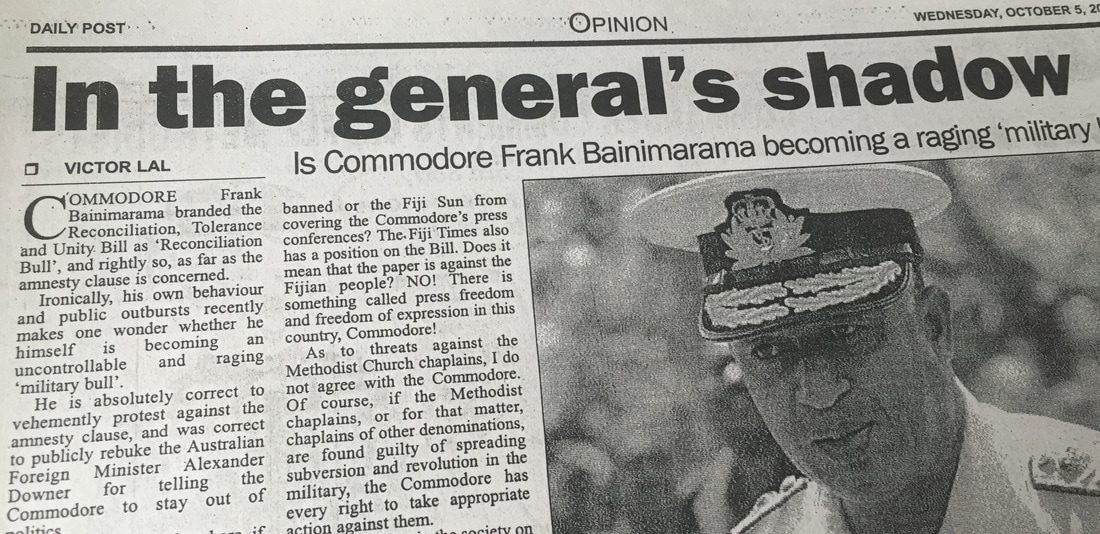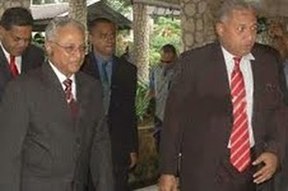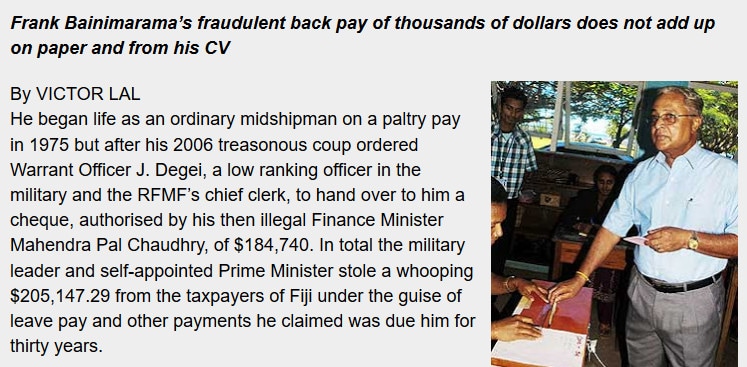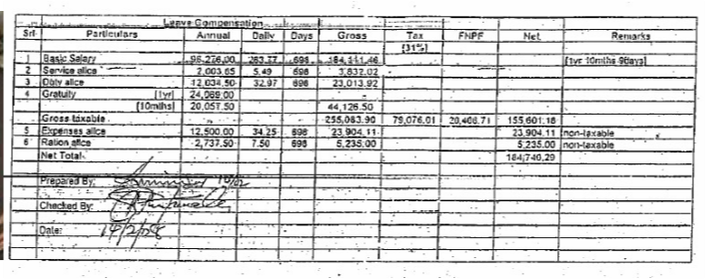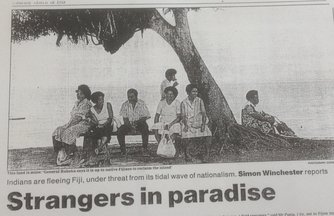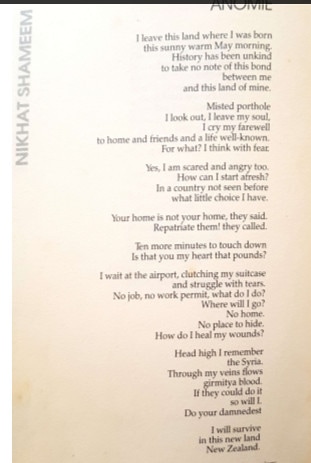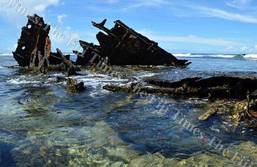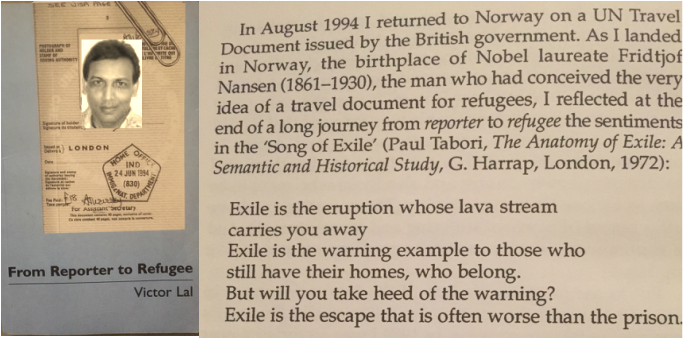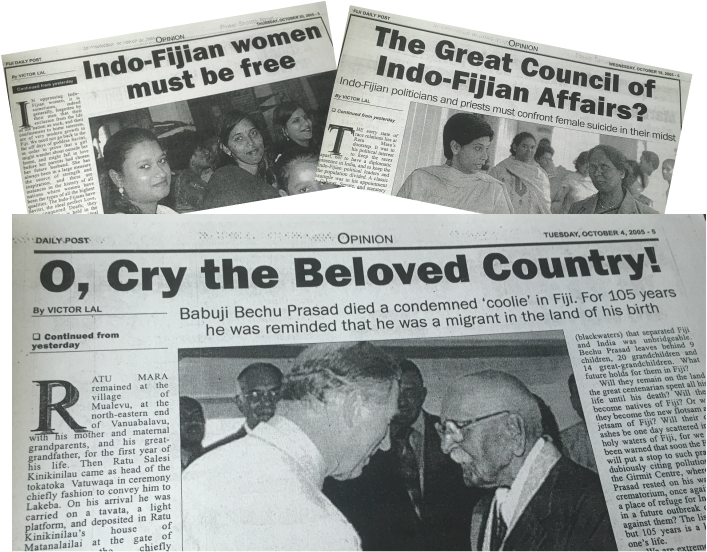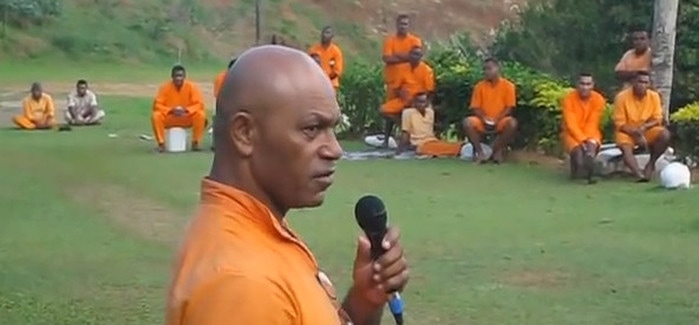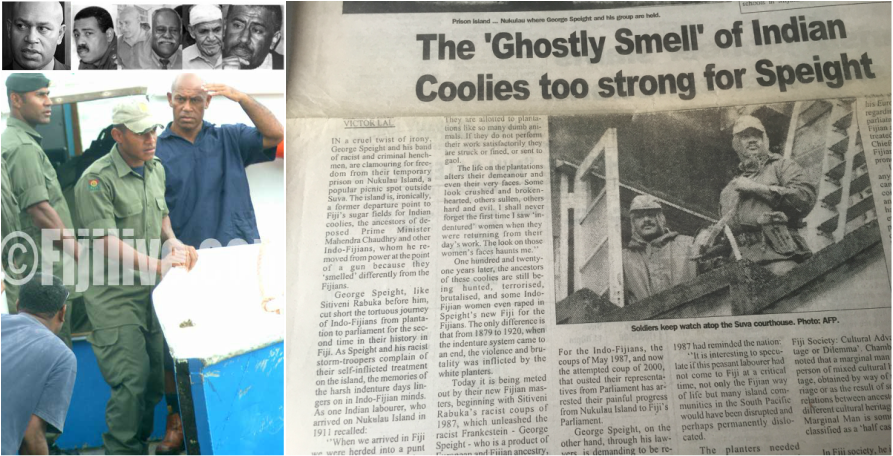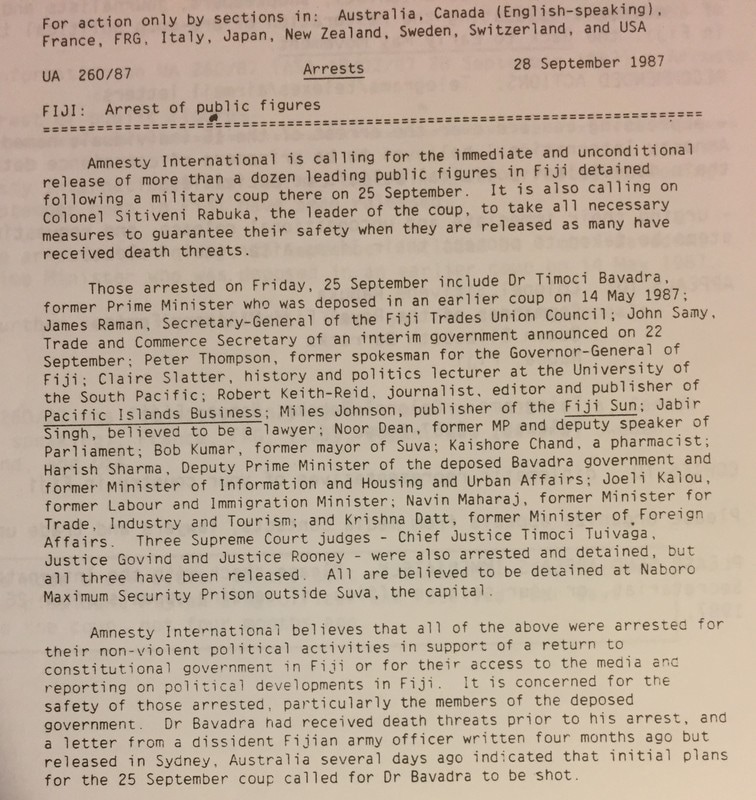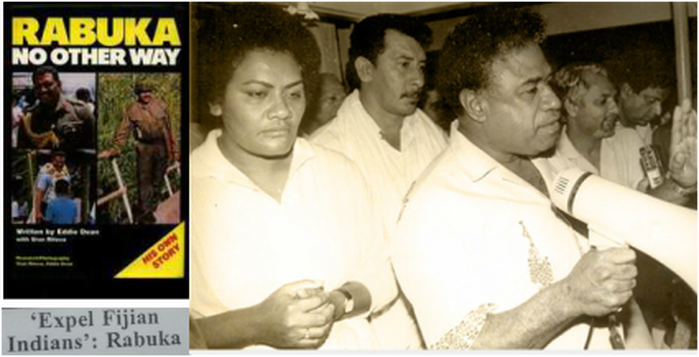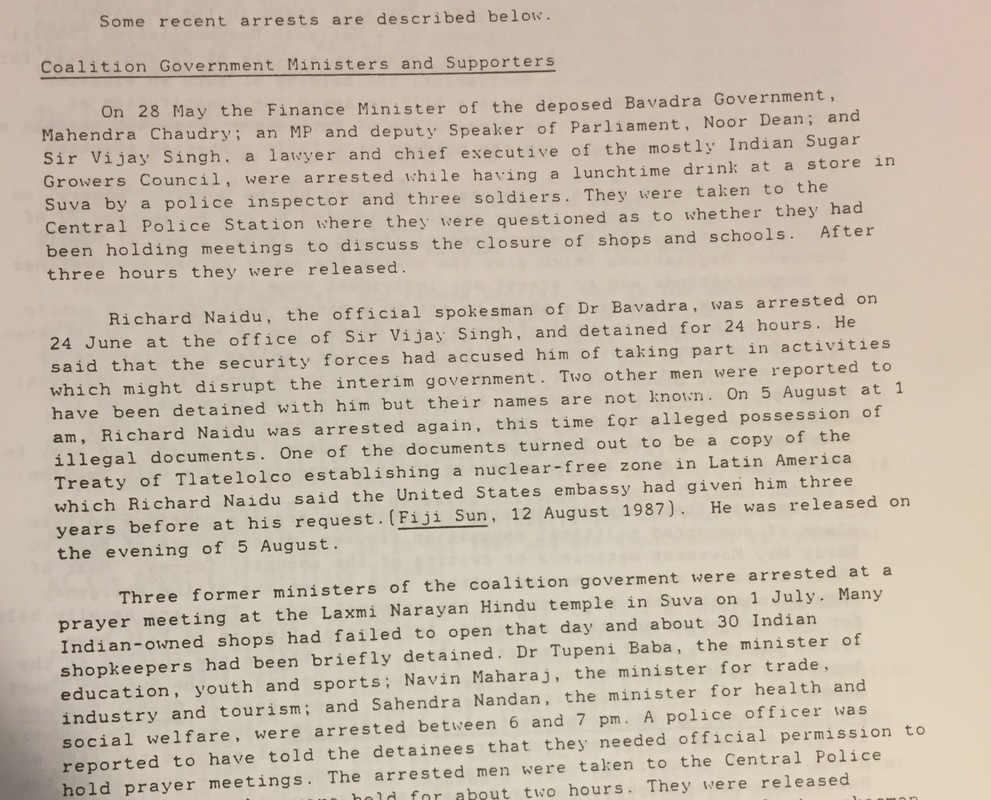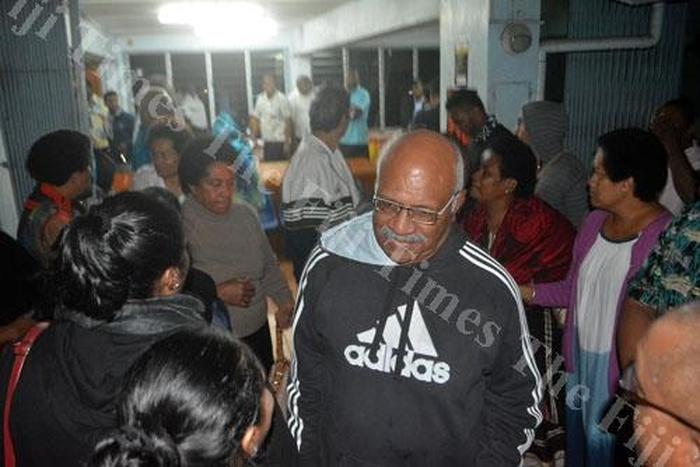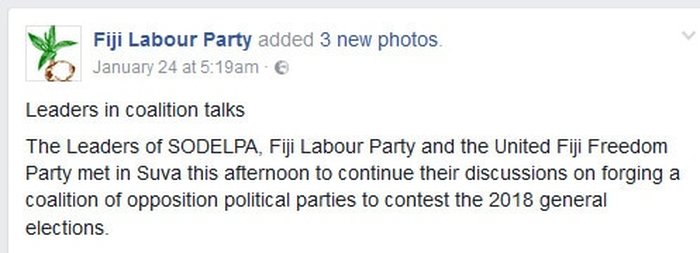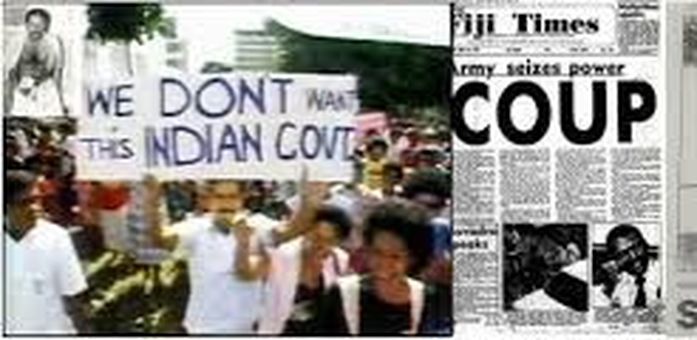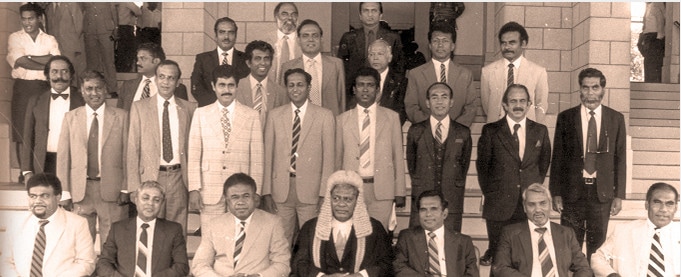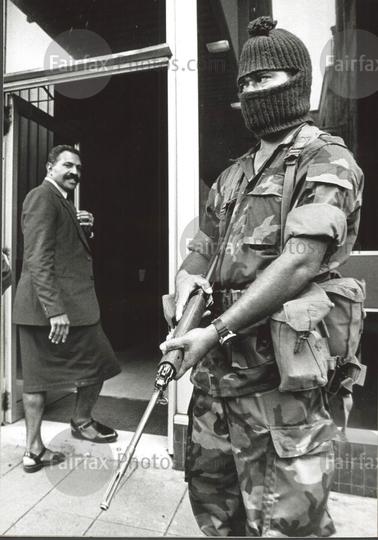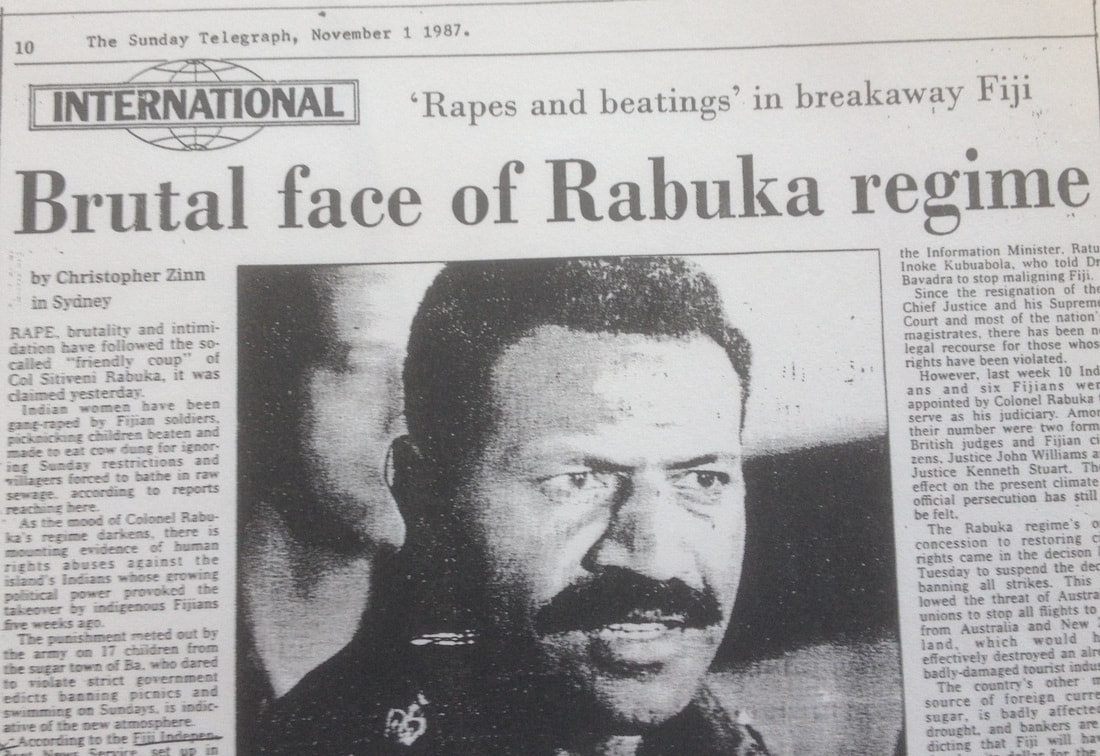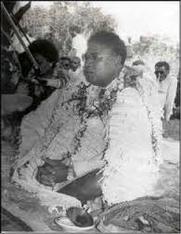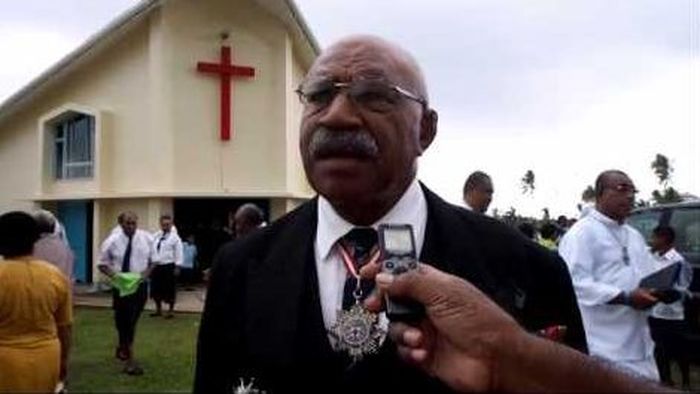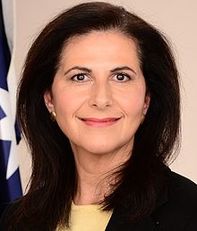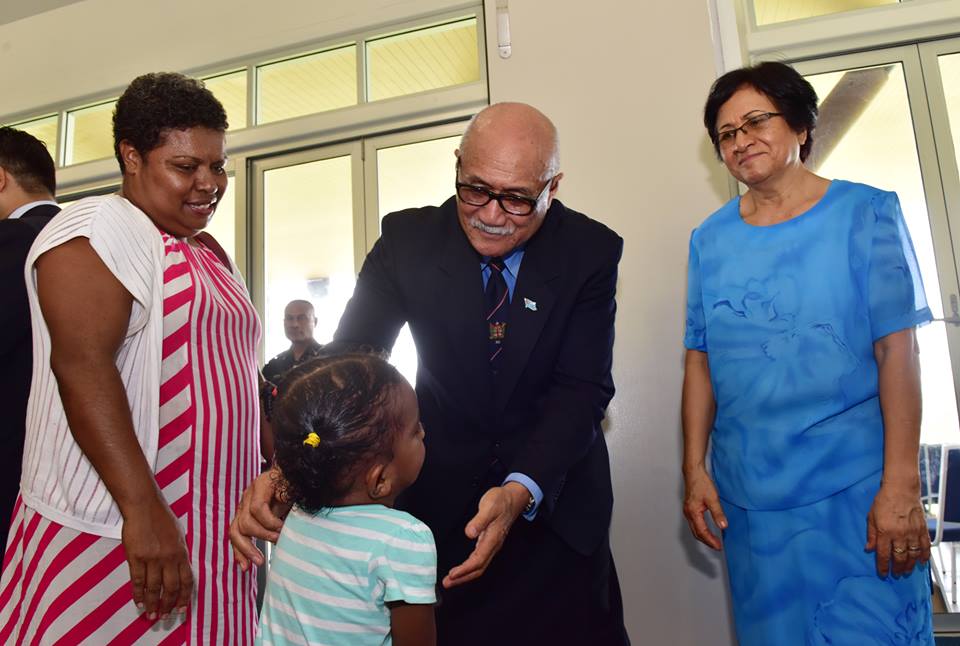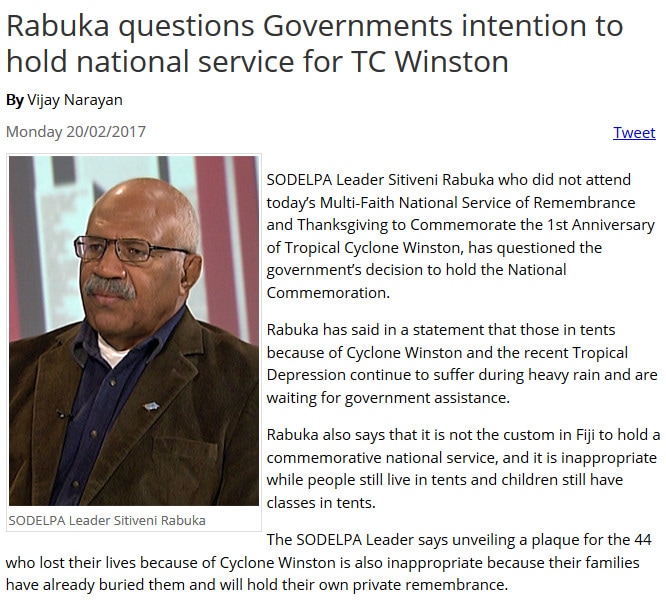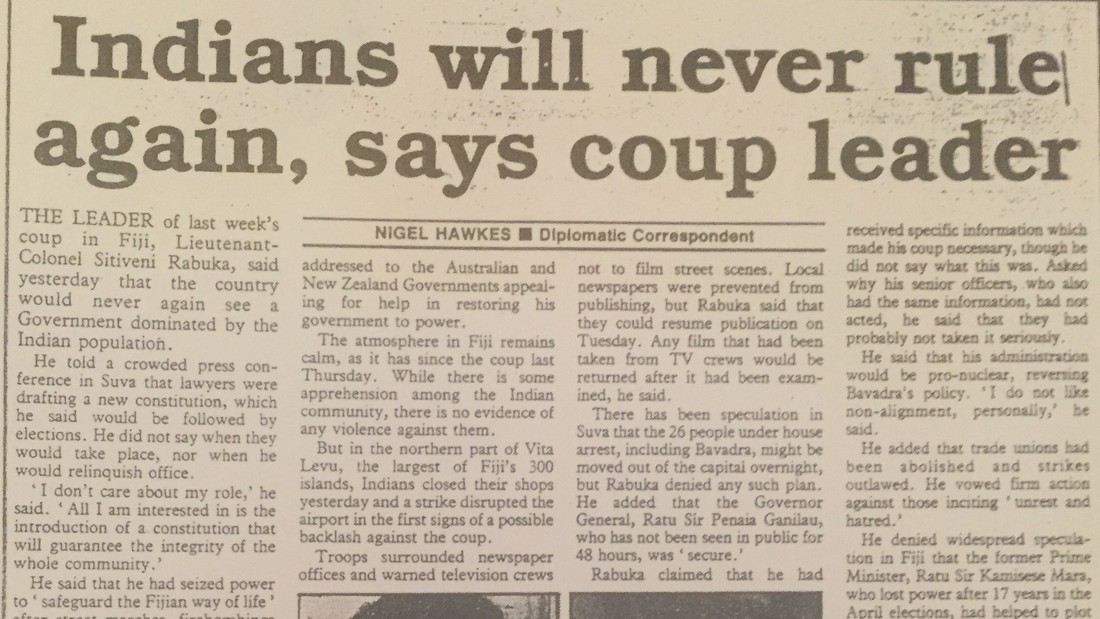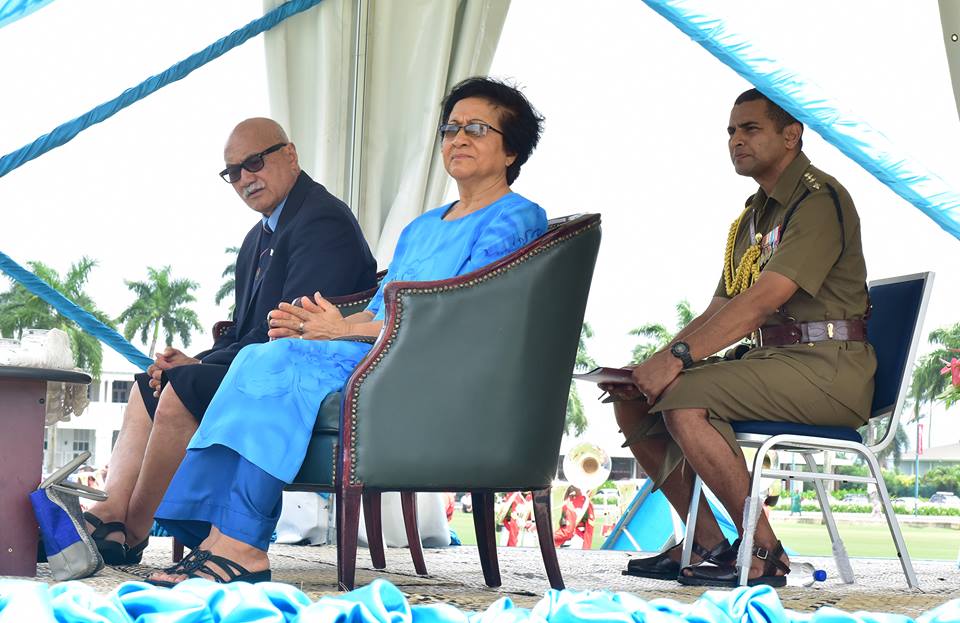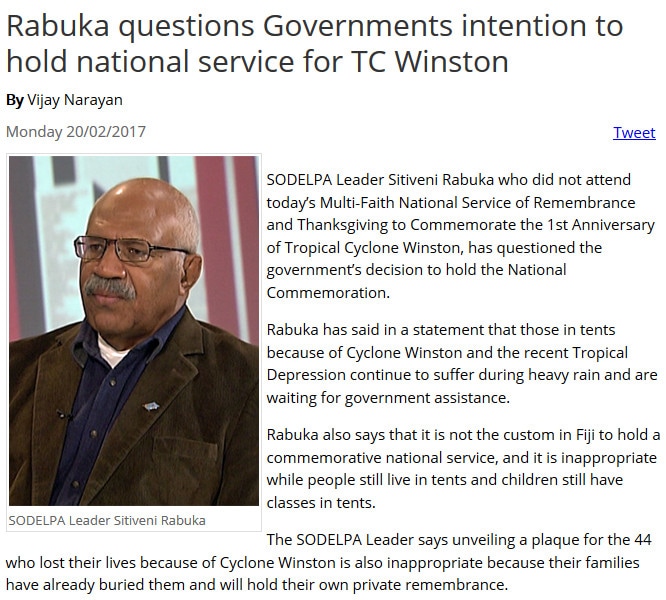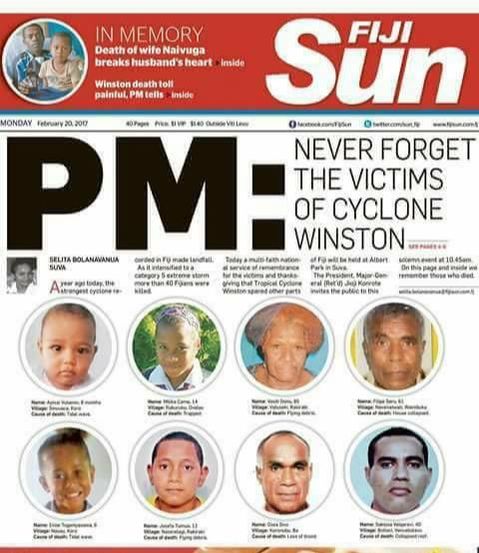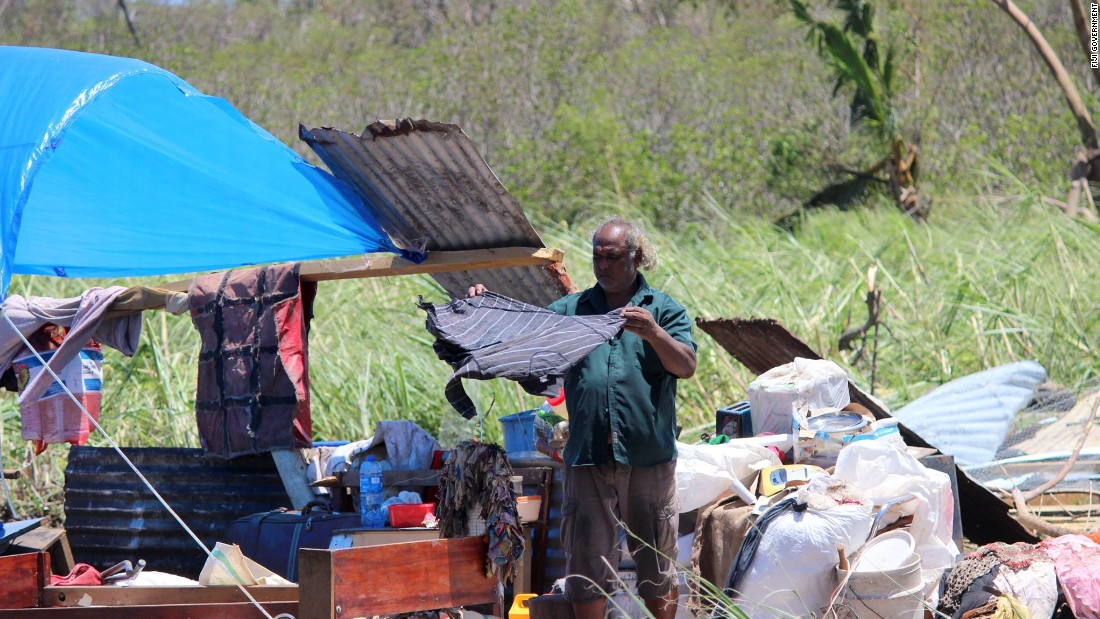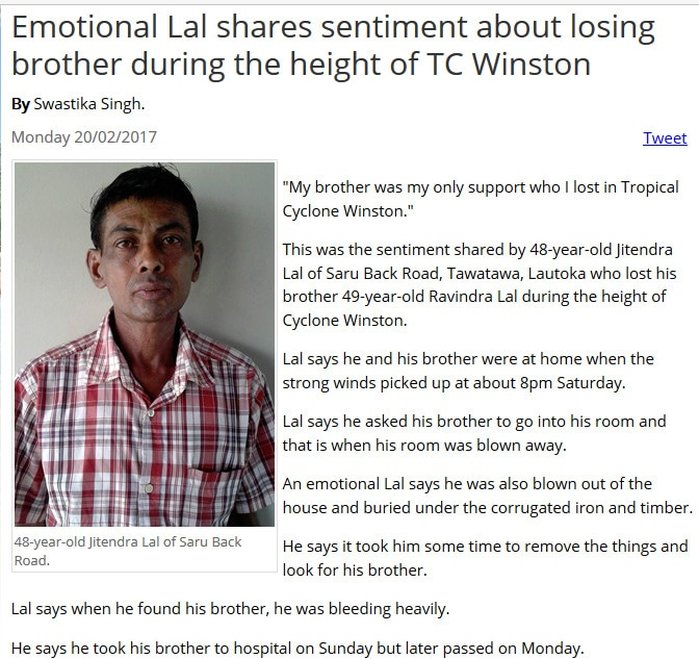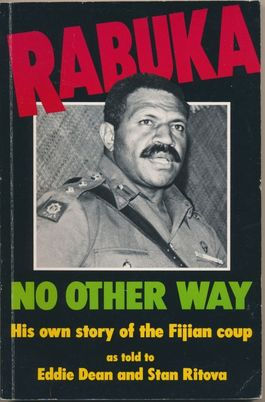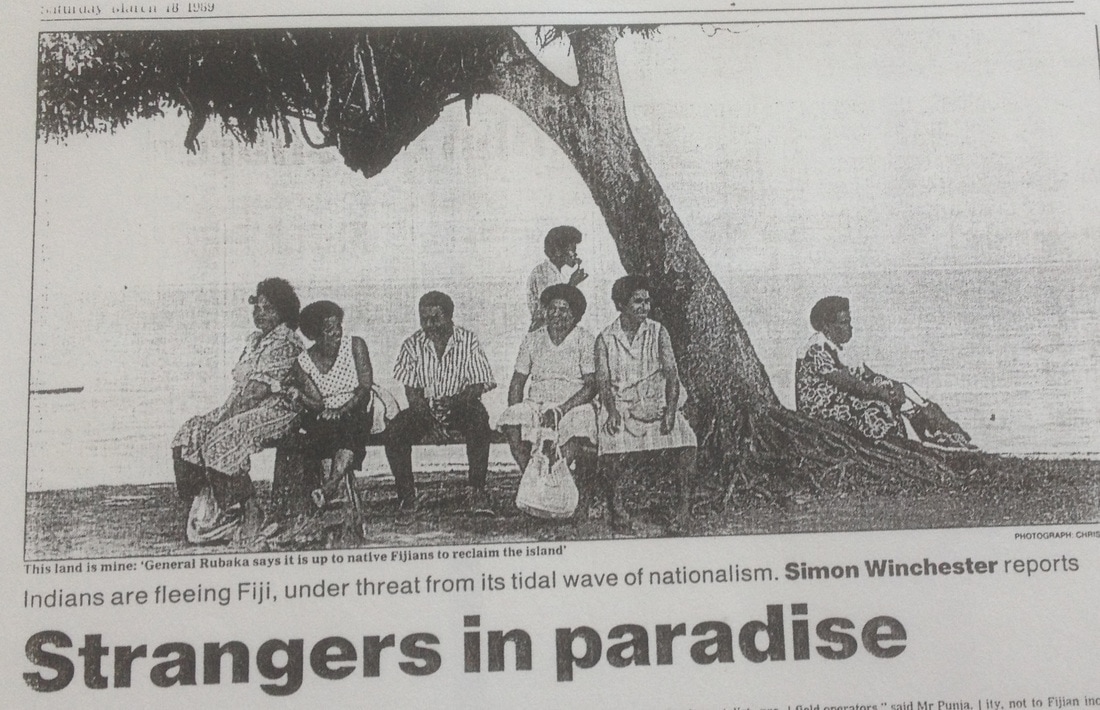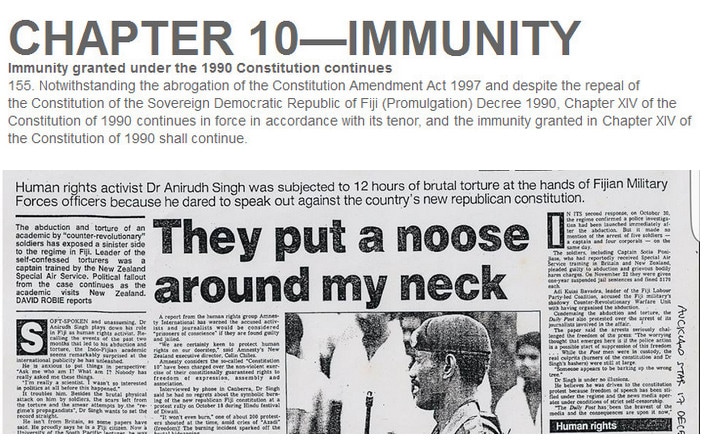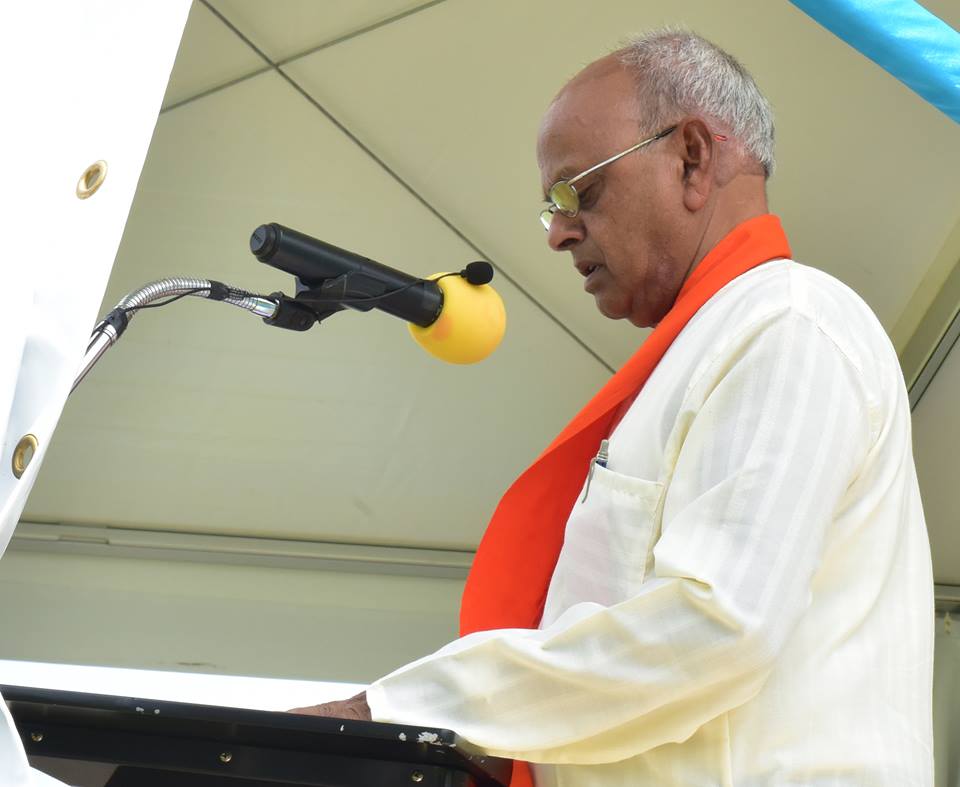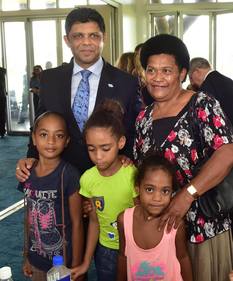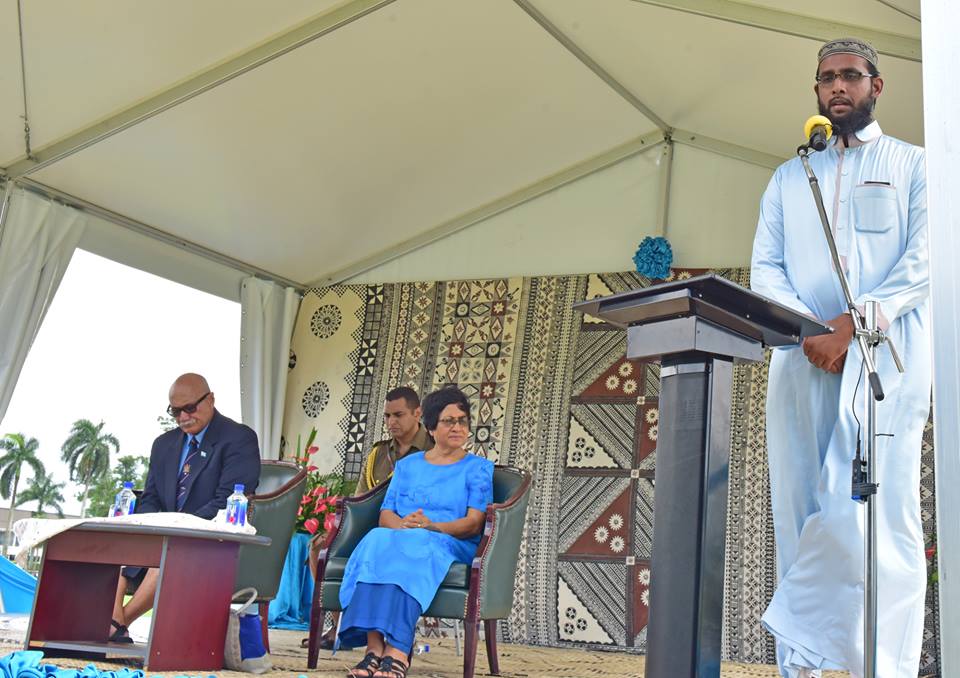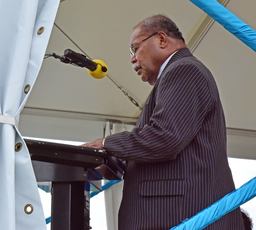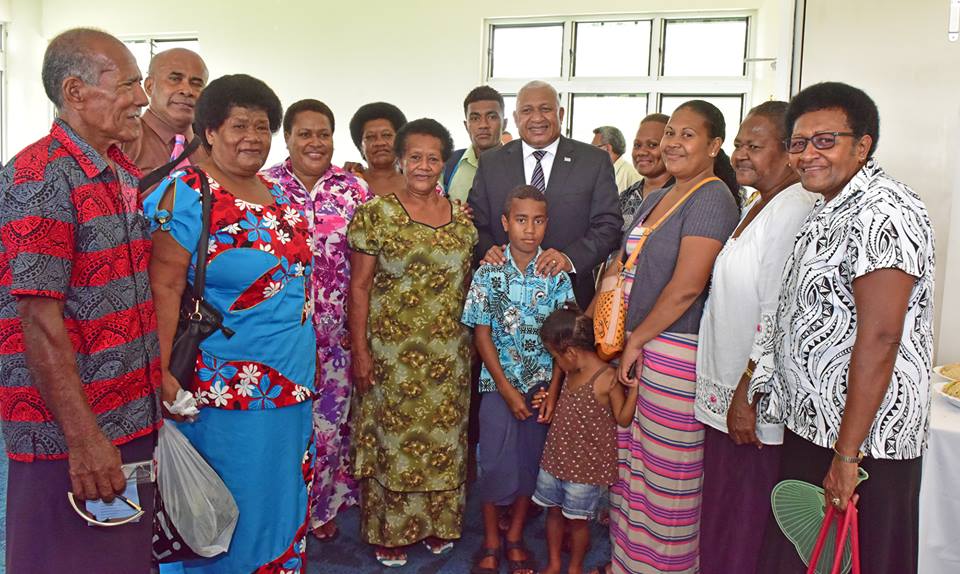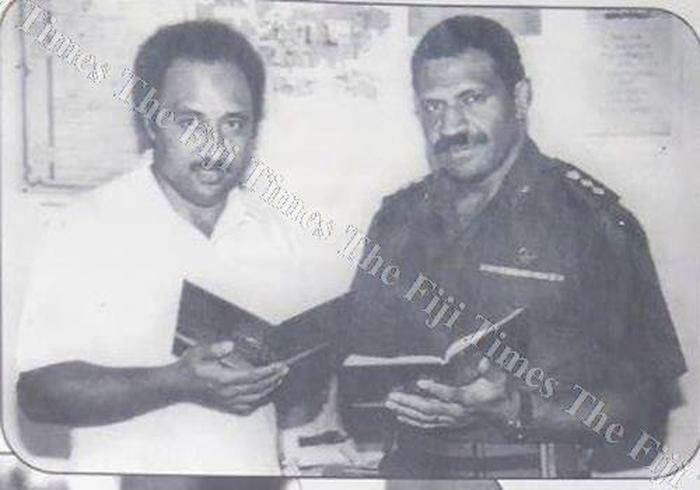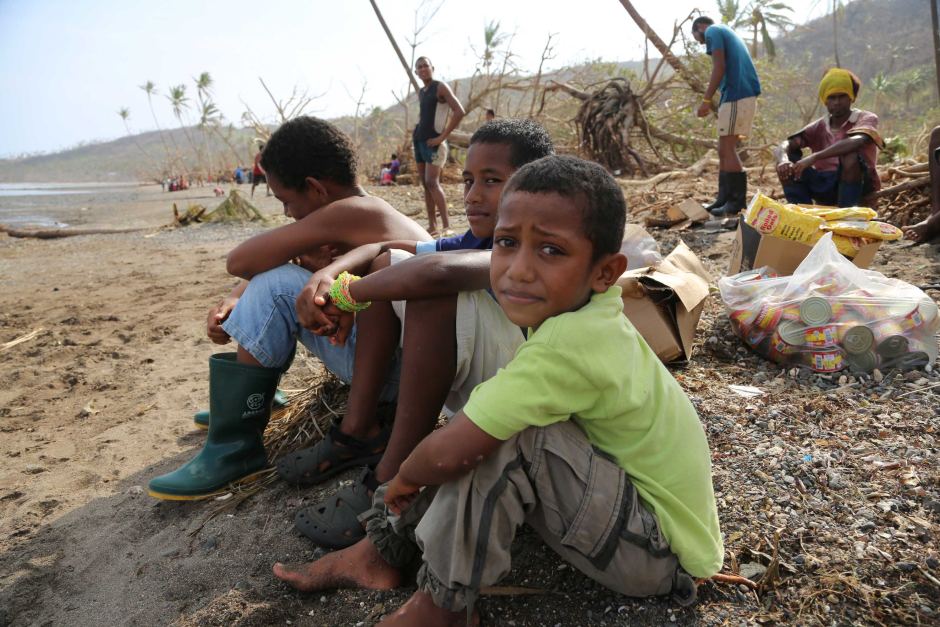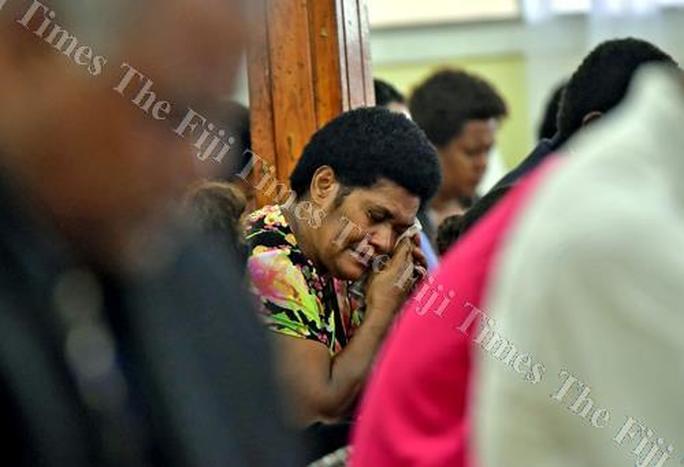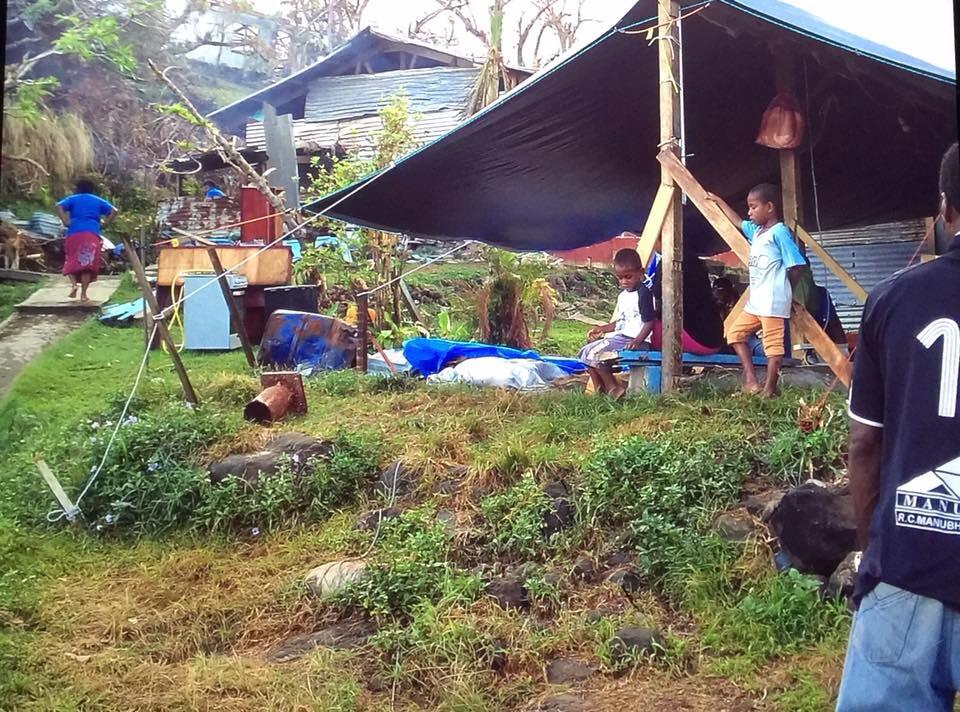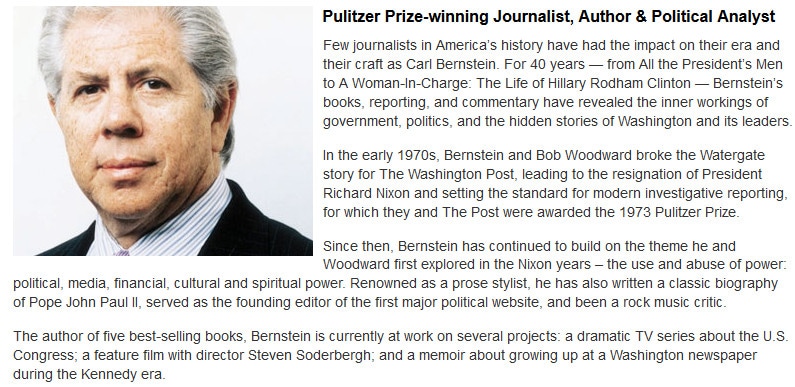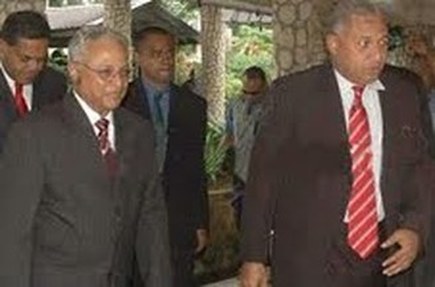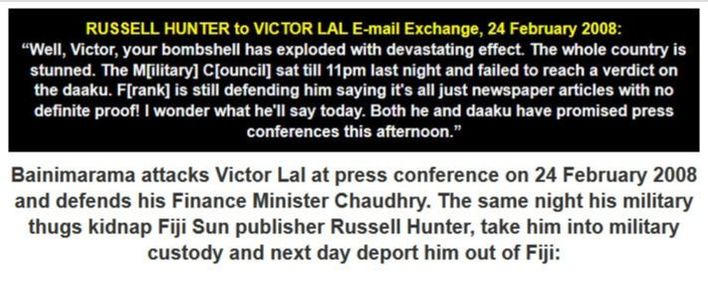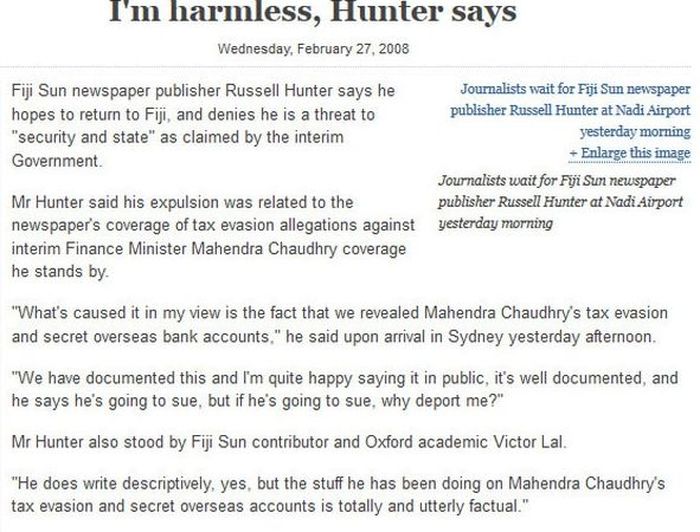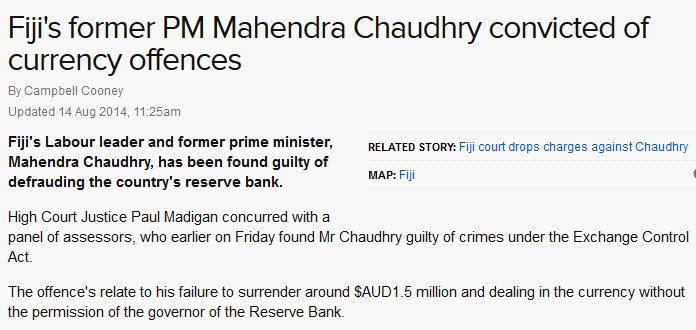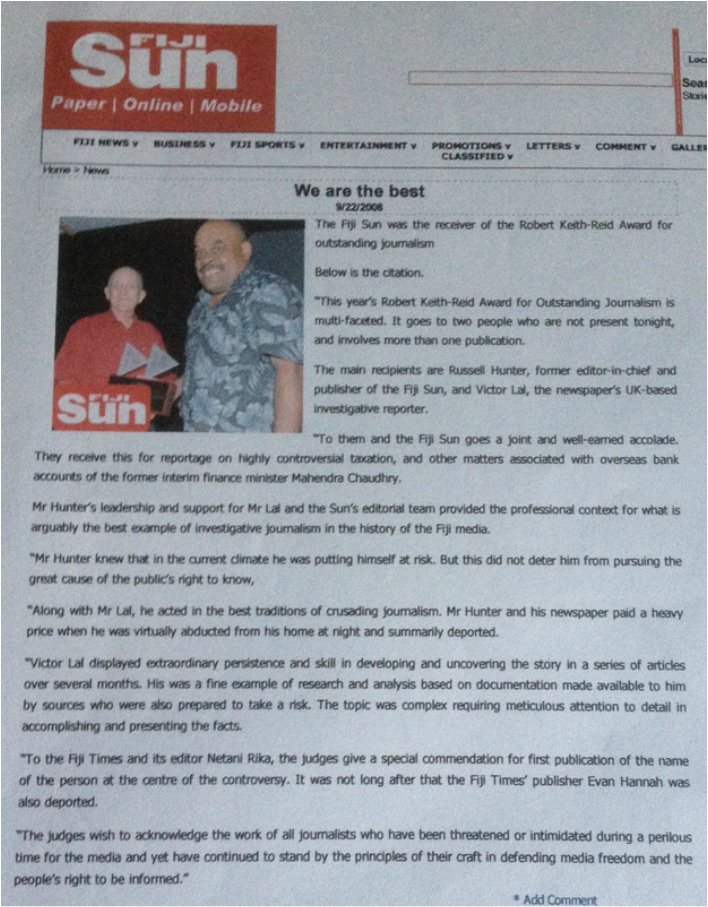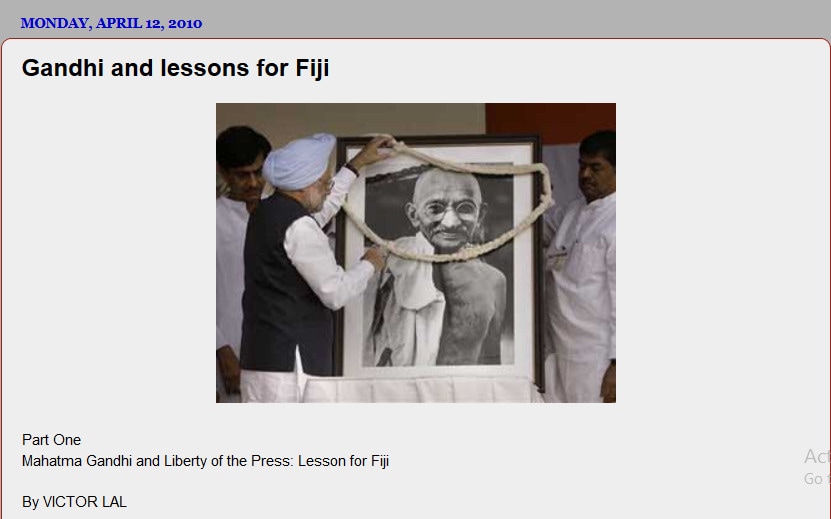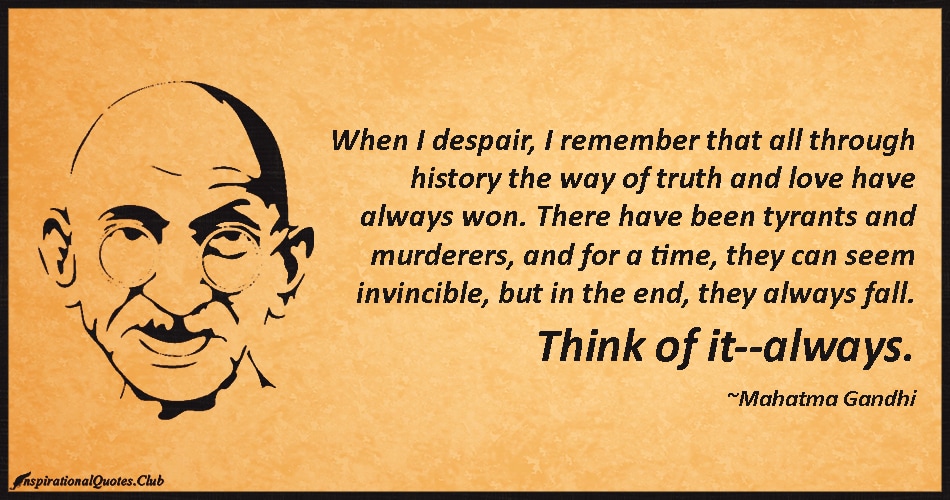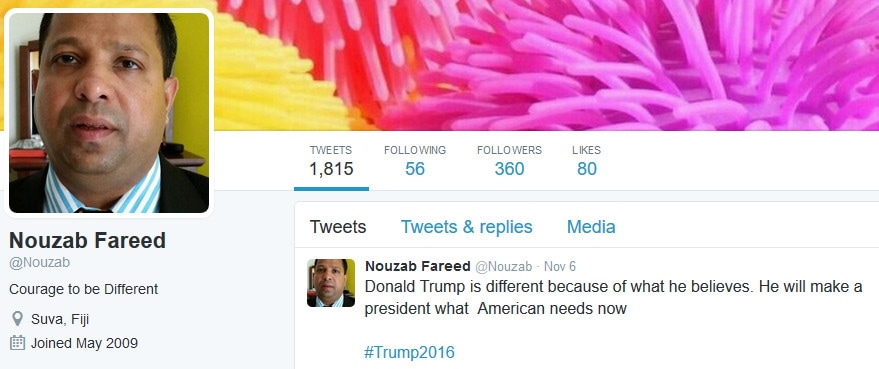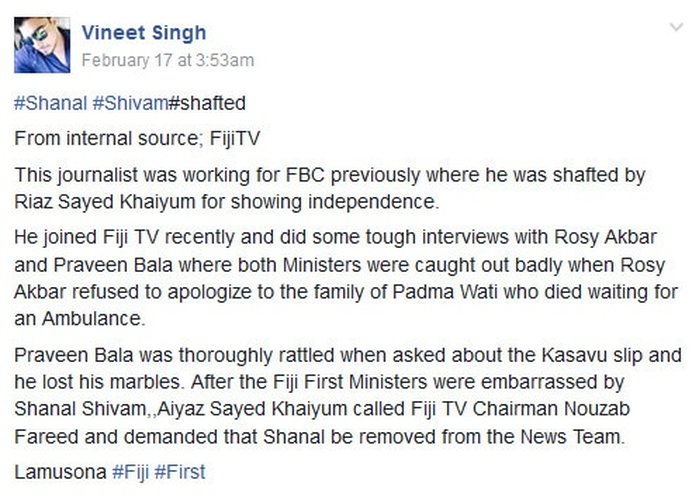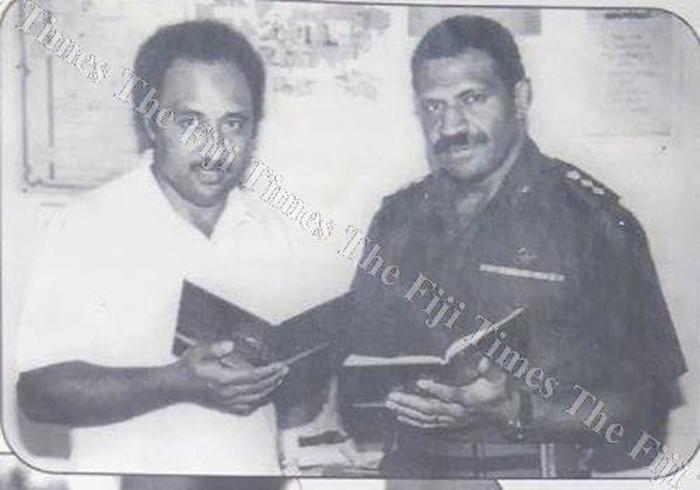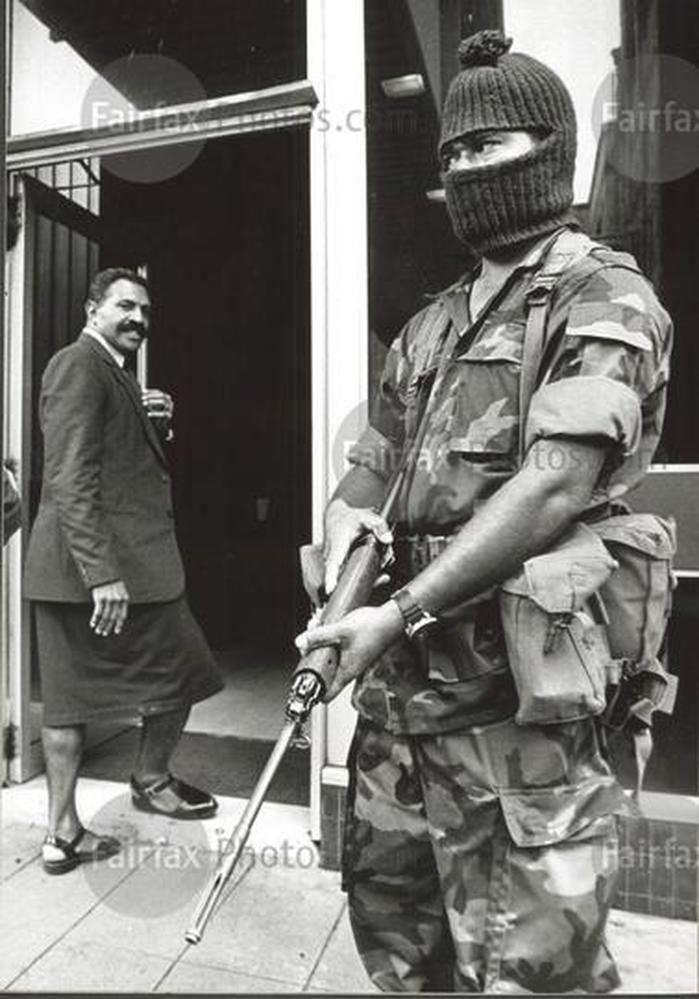Meanwhile, detention, flight, and exile from dictatorship has been part of Indo-Fijian history since the 1987 Sitiveni Rabuka coups:
13 Comments
"I was harassed and threatened by the coup makers and their cohorts in numerous ways, including being dragged to the military barracks for interrogation and intimidation" - The former Fiji Times Editor Kumar “I left Fiji in 1991, sad and disillusioned. Sad, because the country of my birth, where our ancestors’ bones lie interred, no longer made me feel welcome. Disillusioned because a nation once internationally hailed as a peaceful paradise and a showcase for democracy and multiracial harmony turned out, in the end, to be a purgatory for half its people. For beneath the thin veneer of a civilized and enlightened society lurked serious undercurrents of racial tension and hostility.” - Vijendra Kumar Dr Shailendra Singh, a former journalist at The Fiji Times from 1989 to 1996, and now the co-ordinator of the USP Journalism Program, reviewed Kumar's "Diary" in the Fiji Times, 5 February 2017  Shailendra Singh Shailendra Singh A Fiji Diary: Reminiscences and Reflections of a Newsman is a selection of revised and updated writings by Vijendra Kumar, the former editor of The Fiji Times, compiled into an engaging and highly readable book. The 13 sections and 100-odd pages combine Kumar's personal experiences and journalistic views to provide unique insights into some major events that shook Fiji, and shaped its future. The portrayal is enriched by anecdotes of Kumar's encounters with some important personalities who, for better or worse, influenced the country's destiny. Fiji's founding prime minister Ratu Sir Kamisese Mara features quite heavily. Competing with him for space is Sitiveni Rabuka of the 1987 coup notoriety. At the narrative's heart are the vivid accounts of Kumar's remarkable life story while growing up in Nadi. What emerges is a fascinating portrait of the simplicities as well as the complexities of a life lived in Fiji — a depiction many Fijians would readily identify with. Kumar started in journalism humbly enough: as a self-taught, underpaid, and sometimes unpaid proofreader cum reporter/editor of the National Federation Party (NFP) mouthpiece, the weekly Pacific Review. Duties included errands to collect editorial copy from party leader, the late AD Patel's home. In the book, the prominent Nadi lawyer comes across as somewhat snooty — a pukka sahib in Kumar's words — and rather tardy with deadlines, often giving Kumar the runaround. When he plucked the courage to ask for his pay, Kumar was shown the empty office till. On a lucky week, he received $25. This saw Kumar take up high school teaching, a job he stuck with for 12 years, before returning to his true calling as a reporter, but this time at The Fiji Times, in 1969. Within six years, Kumar had become the first local editor at the iconic national daily, up until then largely an expatriate stronghold. His resignation in 1991 and subsequent migration to Australia was a consequence of Fiji's first coup in 1987. Kumar dwells on the coup at length, which is hardly surprising, since the coup's impact was not just stunning, but also enduring. The trauma was felt deeply, both at the national and personal levels. During his time in Australia, Kumar served as a subeditor at the Courier Mail in Brisbane, before retiring in 2001. It was a remarkable journey for a descendent of Indian indentured labourers; one who left home at the tender age of six to live with his aunt to gain access to better education. Kumar's insights matter: As the editor of The Fiji Times, he was at the vantage of major developments in the country's history, observing them unfold, interpreting them, and reporting their impacts nationally. In the first chapter, "Goodbye to Paradise", it's apparent that even a newspaperman like him was taken in by Fiji's relative post-independence calm. The mirage was shattered by the 1987 Sitiveni Rabuka nationalist coup. In Kumar's view, the coup turned Fiji into a "purgatory for half its people". The post-coup media crackdown created a precarious environment for journalists. Kumar writes that the editorship was always a "hot seat" but after the coup the "heat became almost unbearable". After four years of "harassment, intimidation and outright threats", he felt that he could no longer discharge his professional duties with "honesty and without fear". Kumar expresses disappointments and regrets without rancour. His measured analysis demonstrates an astute knowledge of Fiji politics and a deep respect for Fijian culture. "The Fall of a Titan" was his tribute to Ratu Mara after his death in April 2004. Kumar notes that the Rabuka coups not only signalled the death of democracy, but also the fall of a titan in Ratu Mara, who hastened his own demise by failing first to condemn the coup, and then, by leading the post-coup regime. Coups are by nature replete with irony. Mara was accused of being behind the very coup that, in the eyes of many, tarnished his record. The suspicions were fuelled by none other than a brooding Rabuka, who said he felt used and betrayed by the coup's unseen power-brokers. In Kumar's view, Ratu Mara "dedicated his life to his country" and will be "kindly judged by history. The Pacific Island states have produced no greater son," he writes. But Ratu Mara critics, who accuse him of a litany of sins — ranging from racism to corruption, and crony capitalism to political opportunism — would strongly disagree with Kumar. Like many a leader, Ratu Mara was a controversial figure. The team of reporters that Kumar headed did not spare Mara, even though Kumar had gotten to know him personally. If Kumar's portrayal in the book sounds more forgiving, it's probably because of hindsight and reflection. His evaluation possibly stems from a more holistic analysis of Ratu Mara's record, and a healthier appreciation of the frailties of human beings. Even Gandhi is reported to have had skeletons in his closet. Ratu Mara tried to be a political centrist, and if he failed, the fault wasn't his alone. The middle ground in an ethnically-divided country like Fiji is a precariously fine line. It's a slippery slope that has claimed quite a few political scalps, such as the doomed multiracial coalition headed by opposition leader Jai Ram Reddy and Prime Minister Rabuka in 1999. Rabuka's fall in particular added to the ironies of the 1987 coup. Kumar highlights a number of such political absurdities. His soft side surfaces in his tribute to the late Irene Jai Narayan. The fiery Narayan was shunned by her National Federation Party electorate after she crossed the floor to join Ratu Mara's Alliance Party in 1987. Kumar not only dissects Narayan's defection, but he also highlights her distinguished service to the country. "She lit a spark among women," he states. Fiji academic, Professor Satendra Nandan pins down Kumar's style best in the book's foreword: Kumar "provides a balanced picture with a rare generosity of mind, but often with sharp and discriminating insights". This attitude explains why Kumar was a highly-regarded newspaper editor, even in the face of growing skepticism about the ethics of a market-driven media, increasingly locked in fierce ratings and circulation wars. Academics like McNair and Fallow have drawn attention to the emergence of an increasingly aggressive form of journalism that has given rise to a "decline of deference", with political leaders considered prized targets. This trend marks a wide paradigm shift in political reporting — from "healthy skepticism" and an "independent, adversarial relationship with politics", to a "corrosively cynical and hyper-adversarial" posture. Media researcher Spiess calls it "attack dog journalism" — an aggressive reporting strain that goes beyond the watchdog role and harms "fledgling democracies" by "nurturing intolerance and diminishing faith" in leaders. Some media analysts partly attribute the fall of prime minister Mahendra Chaudhry's government in 2000 to media hyper-adversarialism. Others see media hyper-adversarialism as just a theory. But even as a theory, media hyper-adversarialism is pertinent for a vulnerable, multi-ethnic democracy such as Fiji. In Fiji, sound and mature editorial judgments are crucial for public trust and confidence, especially in crisis situations. In this respect, it's likely that Kumar's clear-thinking and foresightedness helped steer The Fiji Times through the dangerous 1987 coup waters without sinking into oblivion. The second coup in September 1987 forced the paper's closer for seven weeks. It reopened after direct representations to Rabuka, who only asked that the paper not publish inflammatory material. Regrettably, Fiji's second national newspaper, The Fiji Sun, which had also bravely criticised Rabuka's actions, closed for good after the first coup. While forced out of Fiji by circumstances, Kumar, like many exiles, is still emotionally attached to the country. His multicultural outlook is reflected in his qualified support for Voreqe Bainimarama's 2006 coup. In "The Rise of a Reformer", first published in 2012, Kumar sees Bainimarama's mission as reforming a flawed, racially-based political system and building a stronger democracy. Overall, Kumar's disdain of a coup culture is evident. He writes: "Although coup-makers' corpses eventually end up rotting on the dung heap of history, the countries experiencing such dislocation continue to wallow in a social, economic and political quagmire for a long time." Kumar then poses a poignant question: "Can Fiji go against the tide of history?" That is no doubt the silent prayer of many a coup-jaded Fijian. A Fiji Diary: Reminiscences and Reflections of a Newsman, is available at, and can be ordered through, the USP Bookshop, Laucala campus, Suva. "Although coup-makers' corpses eventually end up rotting on the dung heap of history, the countries experiencing such dislocation continue to wallow in a social, economic and political quagmire for a long time." - Vijendra Kumar |
After 2000 Speight coup:
2000 George Speight Coup (Failed) - Victor Lal's public and behind-the-scene role in bringing George Speight's TREASON to an end! Bainimarama had signed the Muanikau Accord, freeing Speight
After 2006 Bainimarama coup:
SHOCKINGLY, when Mahendra Chaudhry flew into London from India and was met by VICTOR LAL and other members of the Movement for Democracy in Fiji in 2001, he did not have the courtesy to inform them that "Mother India" was going to secretly transfer millions into his Sydney bank account. Who says RACISM in Fiji does not pay? Speight coup made Chaudhry multi-millionaire, as Victor Lal found out seven years later, in 2008:
FIJILEAKS WILL CONTINUE TO HOLD POWER TO ACCOUNT WITHOUT FEAR OR FAVOUR:
"CRY THE BELOVED COUNTRY"
The following poem by Nikhat Shameem, published in 1995, captures the plight of the Indo-Fijians in Rabuka's Fiji:ANOME I leave this land where I was born this sunny warm May morning History has been unkind to take no note of this bond between me and this land of mine Misted porthole I look out, I leave my soul I cry my farewell to home and friends and a life well-known For what? I think with fear Yes, I am scared and angry too How can I start afresh? In a country not seen before what little choice I have Your home is not your home, they said Repatriate them! they called Ten more minutes to touch down Is that you my heart that pounds? I wait at the airport, clutching my suitcase and struggle with tears No job, no work permit, what do I do? Where will I go? No home No place to hide How do I heal my wounds? Head high I remember the Syria Through my veins flows girmitiya blood If they could do it so will I Do your damnedest I will survive in this new land New Zealand |
And an extract from Victor Lal's autobiography on the plight of "Exiles"
“The world is what it is; men who are nothing, who allow themselves to become nothing, have no place in it.”
V.S. Naipaul,
The Indo-Trinidadnian writer and Nobel laureate, in
A Bend in the River
SODELPA leader Sitiveni Rabuka makes his way out of the Totogo Police Station after being released from police custody last September, 2016; Rabuka and other Opposition leaders were accused of holding meeting without police permit
* His statement is a blatantly racist comment that implies that it was others who imposed this service on native Fijians;
* Or is it that the Christian fundamentalists refuse to be railroaded into a multi-faith service?
* Look at the emotion at that event from ordinary people. And it was mostly native Fijians.
* And look at the comment of the British High Commissioner to Fiji, Melanie Hopkins, about how great it was: "Today’s commemoration was entirely appropriate and a solemn event as would be expected for the scale of the disaster that hit Fiji."
* Sitiveni Rabuka hasn’t changed at all. He just doesn’t accept the notion of a multi-cultural, multi-faith Fiji or the notion that we can develop new and more inclusive national commemorations at which everyone feels welcome;
* If the Methodist talatalas aren’t up the front and the prayers don’t end with “in the name of our Lord and Saviour, Jesus Christ”, Rabuka isn’t interested;
* You would think the Methodists and Rabuka would learn their lesson but it seems that the more things change in Fiji, the more they stay the same.
RABUKA (and Ro Kepa and the Opposition) refused to turn up at Albert Park for the prayer with the Winston victims, and yet the SODELPA leader had travelled all the way to Donald Trump's White House to attend the National Prayer Breakfast, formally known as the Presidential Prayer Breakfast. Through the years, many of the attendees mistakenly believe the event has been sponsored by the White House. In reality, the breakfast is organized by the shadowy and powerful Fellowship Foundation, an organization that was founded by pro-Nazis before World War II.
Rabuka couldn't pull himself up and join President Konrote in the prayer - not because he was not well but because it was a multi-cultural event
Fijian people resilient, says Aussie Minister – The Multi-Faith National Service of Remembrance and Thanksgiving was not only an event to commemorate the death and destruction brought about Tropical Cyclone Winston but to celebrate the resilience of Fijian people. Australian Minister for International Development and the Pacific, Senator Concetta Fierravanti-Wells made the remarks yesterday. She was among diplomats, Government ministers, victims of Tropical Cyclone Winston, relatives of those killed and others present at the event at
Albert Park. Source: Fiji Times; The Australian media would have branded the Opposition as "mugs"
SADLY, the Opposition parties in Fiji are bereft of political common sense. They will run to celebrate Australia Day or American 4th of July. They should have inter-mingled with Winston victims to find out the TRUTH from FICTION promoted by the FijiFirst Party government
Fijileaks: We wanted the anniversary to be held so that the victims could mourn not only their loss and lost but to also hold FFP government to account; the President says 40,000 homes were destroyed by Cyclone Winston but Aiyaz Khaiyum states that 23,388 families have received rebuilding grant. So, where and who are the missing 17,000 families not included in the rebuilding scheme?
From Fijileaks archive, 7/12/2016
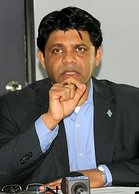
KHAIYUM: 23,388 people assisted under the Help for Homes Initiative in Phase
This has been confirmed by the Minister for Economy and Attorney General Aiyaz Sayed‑Khaiyum. Sayed‑Khaiyum says that 11,331 applicants received $1,500 each, 4,100 applicants received $3,000 each while 7,957 applicants received $7,000 each after Cyclone Winston.
Sayed‑Khaiyum says people whose names were not in the NDMO’s list for this initiative were also assisted. He stresses that there was a significant demand of building materials in Fiji and also internationally therefore it was noted that there was a shortage of some materials such as concrete blocks, iron and timber. He says this is one of the factors that caused delays in delivering of materials to residents.
The Minister says hardware companies could not contact recipients since they moved from where they used to live and the tropical depression in December was also one of the factors that caused delays. He also highlighted that hardware companies who had not performed well had also complied with the 4 percent interest imposed on them and paid government a total sum of $697, 662. He says the companies who paid the interest are Vinod Patel, RC Manubhai and Carpenters Hardware.
These companies have been also excluded from the phase 2 of the initiative. The government has spent $88 million so far to assist people living in cyclone affected areas and another $20 million was allocated in the 2016/2017 National Budget. 80% of schools will still be under construction this month. Sayed‑Khaiyum says more than 490 schools were affected in Cyclone Winston and a total of 166 schools comprising of more than 1,500 buildings have been identified for rehabilitation.
He says that out of 1,550 buildings, 844 buildings required structural upgrading while the remaining 340 buildings required new construction. A total of 36 contractors were approached for the contract. The Minister also highlights that there is a shortage of tradesman in Fiji and this is one of the factors that may cause the delay. He says a number of contractors have made applications to bring tradesmen from Indonesia, Philippines and Bangladesh. Source: Fijivillage News, 20 February 2017
This has been confirmed by the Minister for Economy and Attorney General Aiyaz Sayed‑Khaiyum. Sayed‑Khaiyum says that 11,331 applicants received $1,500 each, 4,100 applicants received $3,000 each while 7,957 applicants received $7,000 each after Cyclone Winston.
Sayed‑Khaiyum says people whose names were not in the NDMO’s list for this initiative were also assisted. He stresses that there was a significant demand of building materials in Fiji and also internationally therefore it was noted that there was a shortage of some materials such as concrete blocks, iron and timber. He says this is one of the factors that caused delays in delivering of materials to residents.
The Minister says hardware companies could not contact recipients since they moved from where they used to live and the tropical depression in December was also one of the factors that caused delays. He also highlighted that hardware companies who had not performed well had also complied with the 4 percent interest imposed on them and paid government a total sum of $697, 662. He says the companies who paid the interest are Vinod Patel, RC Manubhai and Carpenters Hardware.
These companies have been also excluded from the phase 2 of the initiative. The government has spent $88 million so far to assist people living in cyclone affected areas and another $20 million was allocated in the 2016/2017 National Budget. 80% of schools will still be under construction this month. Sayed‑Khaiyum says more than 490 schools were affected in Cyclone Winston and a total of 166 schools comprising of more than 1,500 buildings have been identified for rehabilitation.
He says that out of 1,550 buildings, 844 buildings required structural upgrading while the remaining 340 buildings required new construction. A total of 36 contractors were approached for the contract. The Minister also highlights that there is a shortage of tradesman in Fiji and this is one of the factors that may cause the delay. He says a number of contractors have made applications to bring tradesmen from Indonesia, Philippines and Bangladesh. Source: Fijivillage News, 20 February 2017
RABUKA'S RACIST STORMY COUPS CELEBRATED IN HIS BOOKS:
The racist coupist didn't want Winston victims to be remembered in a service and yet got over $50,000 in book publishing deal to CELEBRATE his 1987 coups and the violence and beatings he and his nationalists inflicted on the Indo-Fijians in the name of indigenous rights. He had claimed that GOD came to him in his sleep, WOKE HIM UP, and told him to turn Fiji into a "SATAN'S PARADISE" - to carry out the 1987 coups;
new Census Report to show Indo-Fijian numbers to fall in Fiji
RABUKA: "Hindus and Muslims are pagans who must be converted to Christianity or else we will all become pagans in Fiji"
Fijians still living in leaky tents a year after Cyclone Winston
One year after Tropical Cyclone Winston struck Fiji, the number of people still living in temporary accommodation, including tents, is frustrating the country's Red Cross organisation. Fiji Red Cross director general, Felipe Nainoca, says people on Koro Island are still in tents which are now leaking, so one of his teams has had to go there to put tarpaulins over the tents. Nainoca told Bruce Hill that although a year has passed since the disaster, things in Fiji are still a long way from being back to normal. | Listen to the interview with |
SITIVENI RABUKA, the man who once introduced a strict Methodist sabbatarianism [barbarism] on Fiji's Hindus and Muslims, now says the one year anniversary service to commemorate Severe Tropical Cyclone Winston is inappropriate because thousands continue to suffer due to heavy rain, are still living in tents, and are waiting for help from FFP Government
People still rebuilding after almost a year after TC Winston
Almost a year after the devastation caused by Tropical Cyclone Winston people are still trying to rebuild their lives in the Western Division.
Shri Krishna of Qalau in Rakiraki told Fijivillage that labour cost is still a major setback for the delay to rebuild the houses.
Krishna says that more than hundred houses were damaged in his area and fifteen houses are yet to be rebuilt.
He says the labour cost is high and due to this people cannot afford to pay.
He says neighbors are trying to help each other and this takes a lot of time.
Meanwhile, Mohammed Abbas of Korotale, Rakiraki says close to 30 houses are yet to be completed in their area.
Abbas says 73 houses in Korotale and Narara were damaged during the cyclone last year.
He says some people are still struggling to rebuild their houses because the labour cost is high.
He says residents are receiving materials from the allocated hardware companies under the Help for Homes Initiative but they cannot afford to pay for labour costs as most of the people are farmers and are struggling to provide for their families after the recent flooding.
He says people get together and help each other within the communities every weekend. Source: Fijivillage News
Almost a year after the devastation caused by Tropical Cyclone Winston people are still trying to rebuild their lives in the Western Division.
Shri Krishna of Qalau in Rakiraki told Fijivillage that labour cost is still a major setback for the delay to rebuild the houses.
Krishna says that more than hundred houses were damaged in his area and fifteen houses are yet to be rebuilt.
He says the labour cost is high and due to this people cannot afford to pay.
He says neighbors are trying to help each other and this takes a lot of time.
Meanwhile, Mohammed Abbas of Korotale, Rakiraki says close to 30 houses are yet to be completed in their area.
Abbas says 73 houses in Korotale and Narara were damaged during the cyclone last year.
He says some people are still struggling to rebuild their houses because the labour cost is high.
He says residents are receiving materials from the allocated hardware companies under the Help for Homes Initiative but they cannot afford to pay for labour costs as most of the people are farmers and are struggling to provide for their families after the recent flooding.
He says people get together and help each other within the communities every weekend. Source: Fijivillage News
Heavyweight Republican John McCain has slammed Donald Trump ’s campaign against the media, saying it is “how dictators get started”.
The ex-naval captain, who has clashed with the US President despite being in the same party, issued his warning a day after the leader again criticised the press.
Senator McCain said: “The fact is we need you. We need a free press. We must have it. It’s vital.
“If you want to preserve democracy as we know it, you have to have a free and, many times, adversarial press. And without it, I am afraid that we would lose so much of our individual liberties over time. That’s how dictators get started.”
Mr McCain, who stood against Barack Obama in the 2008 presidential election, added: “When you look at history, the first thing dictators do is shut down the press.
“I’m not saying that President Trump is trying to be a dictator. I’m just saying we need to learn the lessons of history.”
Mr Trump has branded negative stories about his administration “fake news”.
Criticising the media, he told supporters at a rally on Saturday: “They just don’t want to report the truth. They have their own agenda, and their agenda is not your agenda.”
Mr Trump also likened himself to predecessors Thomas Jefferson, Andrew Jackson and Abraham Lincoln, saying they had fought against the press.
He went on: “Thomas Jefferson said, ‘Nothing can be believed which is seen in a newspaper’.”
Yet the quote was from a speech where Jefferson backed a free press. The Daily Mail, London, 19 February 2017
The ex-naval captain, who has clashed with the US President despite being in the same party, issued his warning a day after the leader again criticised the press.
Senator McCain said: “The fact is we need you. We need a free press. We must have it. It’s vital.
“If you want to preserve democracy as we know it, you have to have a free and, many times, adversarial press. And without it, I am afraid that we would lose so much of our individual liberties over time. That’s how dictators get started.”
Mr McCain, who stood against Barack Obama in the 2008 presidential election, added: “When you look at history, the first thing dictators do is shut down the press.
“I’m not saying that President Trump is trying to be a dictator. I’m just saying we need to learn the lessons of history.”
Mr Trump has branded negative stories about his administration “fake news”.
Criticising the media, he told supporters at a rally on Saturday: “They just don’t want to report the truth. They have their own agenda, and their agenda is not your agenda.”
Mr Trump also likened himself to predecessors Thomas Jefferson, Andrew Jackson and Abraham Lincoln, saying they had fought against the press.
He went on: “Thomas Jefferson said, ‘Nothing can be believed which is seen in a newspaper’.”
Yet the quote was from a speech where Jefferson backed a free press. The Daily Mail, London, 19 February 2017
The man who brought down President Richard Nixon says Trump is even 'more treacherous'
Watergate journalist Carl Bernstein criticises Donald Trump's 'unhinged conduct' and warns
'The most dangerous ‘enemy of the people’ is presidential lying'
Carl Bernstein warned early Saturday that President Trump's repeated criticisms of the media is "more treacherous" than President Richard Nixon's.
"The most dangerous 'enemy of the people' is presidential lying—always. Attacks on press by @realDonaldTrump more treacherous than Nixon's," Bernstein tweeted.
Real news (not fake) is that @realDonaldTrump trying to make conduct of press the issue instead of egregious (and unhinged)conduct of POTUS.— Carl Bernstein (@carlbernstein) February 18, 2017
The most dangerous 'enemy of the people' is presidential lying—always. Attacks on press by @realDonaldTrump more treacherous than Nixon's.— Carl Bernstein (@carlbernstein) February 18, 2017
He also noted that when the press reported on Hillary Clinton's unauthorized email server, Trump saw journalists as "patriots.
"When focus of press was on Hillary's server—by same 'fake news' orgs/'enemies of the people' cited by @realDonaldTrump—he saw patriots.— Carl Bernstein (@carlbernstein) February 18, 2017
Trump has ratcheted up his rhetoric against the "fake" news media, using part of a press conference Thursday to remark on the "hatred" from journalists.
The president has also taken to Twitter to accuse reporters of making up stories and "'sources'" after leaks about Mike Flynn misleading administration officials on his communications with Russia led to his resignation Monday.
Bernstein is best known for his investigative reporting for the Washington Post that shed light on the Watergate scandal, leading to Nixon's resignation in 1974.
In December, Bernstein warned against Trump's "disdain for the truth."
"Trump lives and thrives in a fact-free environment," Bernstein said on CNN. "No president, including Richard Nixon, has been so ignorant of fact and disdains fact in the way this president-elect does."
"The most dangerous 'enemy of the people' is presidential lying—always. Attacks on press by @realDonaldTrump more treacherous than Nixon's," Bernstein tweeted.
Real news (not fake) is that @realDonaldTrump trying to make conduct of press the issue instead of egregious (and unhinged)conduct of POTUS.— Carl Bernstein (@carlbernstein) February 18, 2017
The most dangerous 'enemy of the people' is presidential lying—always. Attacks on press by @realDonaldTrump more treacherous than Nixon's.— Carl Bernstein (@carlbernstein) February 18, 2017
He also noted that when the press reported on Hillary Clinton's unauthorized email server, Trump saw journalists as "patriots.
"When focus of press was on Hillary's server—by same 'fake news' orgs/'enemies of the people' cited by @realDonaldTrump—he saw patriots.— Carl Bernstein (@carlbernstein) February 18, 2017
Trump has ratcheted up his rhetoric against the "fake" news media, using part of a press conference Thursday to remark on the "hatred" from journalists.
The president has also taken to Twitter to accuse reporters of making up stories and "'sources'" after leaks about Mike Flynn misleading administration officials on his communications with Russia led to his resignation Monday.
Bernstein is best known for his investigative reporting for the Washington Post that shed light on the Watergate scandal, leading to Nixon's resignation in 1974.
In December, Bernstein warned against Trump's "disdain for the truth."
"Trump lives and thrives in a fact-free environment," Bernstein said on CNN. "No president, including Richard Nixon, has been so ignorant of fact and disdains fact in the way this president-elect does."
Fijileaks: Like Donald Trump, Frank Bainimarama suggested it was "FAKE" exposure, to damage his Interim Government and Chaudhry; not long afterwards Aiyaz Khaiyum brought his notorious MEDIA DECREE
The first person to congratulate the Fiji Sun for exposing Chaudhry's secret millions in Australia was Sitiveni Rabuka (now SODELPA leader) when he ran into the then Fiji Sun editor Samisoni Kakaivalu at the golf course on the morning Victor Lal's story broke out in the paper
http://www.coupfourandahalf.com/2010/04/gandhi-and-lessons-for-fiji.html
http://www.coupfourandahalf.com/2010/04/gandhi-and-lessons-for-fiji-press.html
February 19, 2017
MEDIA RELEASE
FHL CEO INTERFERING WITH FIJI TV NEWSROOM
Restrictions placed on a Fiji Television journalist from covering political stories and running Government news without balance from Opposition party figures falsely implicated by Government in its propaganda is a clear sign of collusion between Government and the Chief Executive of Fijian Holdings Limited, the majority shareholder of Fiji TV.
The National Federation Party’s observations of news bulletins for the past two weeks and the fact that a journalist was reportedly told that he can no longer work in the Fiji One Newsroom because of his political stories despite them being balanced and factual, clearly point to interference into the newsroom by Fijian Holdings Limited (CEO) Nouzab Fareed.
The journalist in question Mr Shanal Sivan has not been seen or heard doing news reporting after prominently reporting on Government’s policy failures and false promises from the beginning of this year. (We enclose links to those stories at the end of this statement).
Similarly, after balanced, ethical and accurate coverage of parliamentary proceedings of 6th February of both Government and Opposition responses during debate on various issues in Parliament, Fiji TV News coverage has degenerated into extremely one-sided pro-Government bulletins.
During the parliamentary sitting, apart from 6th February, hardly any response by the Opposition to numerous ministerial statements or contribution to debate was reported in the major bulletins.
Even if it was, it was a small piece compared to long and three or four contributions from Government on the same issue.
And this week, the Attorney General’s statement on issues raised in parliament by the Opposition during debate on the Electoral Amendment Act, particularly why his role as Elections Minister conflicts with his positions as Registered Officer/General Secretary of Fiji First, as well as the Supervisor of Elections being the Secretary to Electoral Commission, was covered three times, on Wednesday, Friday and Saturday this week.
Yet there was no chance given to the Leader of NFP and Opposition MP Mr Semesa Karavaki to respond to the AG despite them being named by the AG as making false statements. The NFP Leader had even issued a statement rebutting the AG’s claims on Thursday but it received no coverage from Fiji TV (and not surprisingly from the taxpayer funded Fiji Broadcasting Corporation(which also ran the AG’s comments) known for its totally pro Government stance for obvious reasons).
The exodus of prominent journalists and senior staff clearly point to interference in Fiji TV Operations and Newsroom. And this is seemingly caused by Mr Fareed’s collusion with Government leading to his interference in Fiji TV Newsroom and other operations.
A clear example of this was his apology to the CEO of Fiji Broadcasting Corporation (FBC) over Fiji’s reporting of Waisea Basha , saying both Fiji TV and FBC needed to cooperate with each other. His actions are undeniably leading to a demoralized work force.
We therefore ask the following: -
These are questions that Mr Fareed, the FHL and the Fiji Media Association must answer in the matter of public interest.
Authorised by
Professor Biman Prasad
NFP Leader
Encl: Links to Fiji TV Stories done by Shanal Sivan
https://www.facebook.com/fijionenews/videos/1405147512884120/
https://www.facebook.com/fijionenews/videos/1404001719665366/
https://www.facebook.com/fijionenews/videos/1399874140078124/
https://www.facebook.com/fijionenews/videos/1397836596948545/
https://www.facebook.com/fijionenews/videos/1393189770746561/
https://www.facebook.com/fijionenews/videos/1353771314688407/
MEDIA RELEASE
FHL CEO INTERFERING WITH FIJI TV NEWSROOM
Restrictions placed on a Fiji Television journalist from covering political stories and running Government news without balance from Opposition party figures falsely implicated by Government in its propaganda is a clear sign of collusion between Government and the Chief Executive of Fijian Holdings Limited, the majority shareholder of Fiji TV.
The National Federation Party’s observations of news bulletins for the past two weeks and the fact that a journalist was reportedly told that he can no longer work in the Fiji One Newsroom because of his political stories despite them being balanced and factual, clearly point to interference into the newsroom by Fijian Holdings Limited (CEO) Nouzab Fareed.
The journalist in question Mr Shanal Sivan has not been seen or heard doing news reporting after prominently reporting on Government’s policy failures and false promises from the beginning of this year. (We enclose links to those stories at the end of this statement).
Similarly, after balanced, ethical and accurate coverage of parliamentary proceedings of 6th February of both Government and Opposition responses during debate on various issues in Parliament, Fiji TV News coverage has degenerated into extremely one-sided pro-Government bulletins.
During the parliamentary sitting, apart from 6th February, hardly any response by the Opposition to numerous ministerial statements or contribution to debate was reported in the major bulletins.
Even if it was, it was a small piece compared to long and three or four contributions from Government on the same issue.
And this week, the Attorney General’s statement on issues raised in parliament by the Opposition during debate on the Electoral Amendment Act, particularly why his role as Elections Minister conflicts with his positions as Registered Officer/General Secretary of Fiji First, as well as the Supervisor of Elections being the Secretary to Electoral Commission, was covered three times, on Wednesday, Friday and Saturday this week.
Yet there was no chance given to the Leader of NFP and Opposition MP Mr Semesa Karavaki to respond to the AG despite them being named by the AG as making false statements. The NFP Leader had even issued a statement rebutting the AG’s claims on Thursday but it received no coverage from Fiji TV (and not surprisingly from the taxpayer funded Fiji Broadcasting Corporation(which also ran the AG’s comments) known for its totally pro Government stance for obvious reasons).
The exodus of prominent journalists and senior staff clearly point to interference in Fiji TV Operations and Newsroom. And this is seemingly caused by Mr Fareed’s collusion with Government leading to his interference in Fiji TV Newsroom and other operations.
A clear example of this was his apology to the CEO of Fiji Broadcasting Corporation (FBC) over Fiji’s reporting of Waisea Basha , saying both Fiji TV and FBC needed to cooperate with each other. His actions are undeniably leading to a demoralized work force.
We therefore ask the following: -
- Is Mr Fareed in contact with or being contacted by Government whenever Fiji TV runs stories exposing Government policies and failures of Government Ministers?
- Why is he interfering and undermining the ethics of accuracy, balance and fairness of Fiji TV Newsroom?
- What did Mr Fareed tell Mr Shanal Sivan resulting in him not being seen or heard doing major news stories?
- Did he tell Mr Shanal Sivan that Mr Sivan’s news stories were hurting Government?
- Did he tell Mr Sivan not to do political stories or keep away from mainstream Fiji One News?
- Did he tell Fiji One Newsroom to re-run the AG’s statement on questions raised in Parliament by the Opposition on his and the Supervisor’s role, and not to run any response from the Opposition as clearly witnessed?
- Why is the Fiji Media Association silent on the matter despite this receiving widespread publicity on the social media?
- Will the Fijian Holdings Limited Board immediately investigate Mr Fareed’s role in Fiji TV?
These are questions that Mr Fareed, the FHL and the Fiji Media Association must answer in the matter of public interest.
Authorised by
Professor Biman Prasad
NFP Leader
Encl: Links to Fiji TV Stories done by Shanal Sivan
https://www.facebook.com/fijionenews/videos/1405147512884120/
https://www.facebook.com/fijionenews/videos/1404001719665366/
https://www.facebook.com/fijionenews/videos/1399874140078124/
https://www.facebook.com/fijionenews/videos/1397836596948545/
https://www.facebook.com/fijionenews/videos/1393189770746561/
https://www.facebook.com/fijionenews/videos/1353771314688407/
He did NOT "EXIT", he was told by his co-coup conspirator Ratu Inoke Kubuabola to step down; as he exited the racist returned to his 1987 language warning Indo-Fijians: "The indigenous Fijian community cannot continue to be expected to be accommodating when there is no just and fair reciprocation from the other communities." As his biographer has put it: "He [Rabuka] was returning to the language of pre-1997, where positions had been taken on race rather than politics. Now the result of the politics he had fought for so hard to put in place was forcing him to revert to the racial position. The irony of it was not wasted on his military mind, but his feeling was one of deep disappointment". He blamed the Indo-Fijians for his humiliating defeat and exit from politics in 1999. He later became chairman of the Great Council of Chiefs. We will write one these days his role following the overthrow of the Chaudhry government
| Number Crunch, Fiji Times, 18 February 2017 LEADERS of the Social Democratic Liberal Party (SODELPA) and the National Federation Party (NFP) are optimistic that Fijians want a change of government in the next general election. Despite the Tebbutt-Times poll revealing that Prime Minister Voreqe Bainimarama remained the top choice for PM if Fiji held the general election tomorrow, SODELPA leader Sitiveni Rabuka believes Fijians were still looking for a change in the country's leadership. |
Responding to the poll that placed him second as the preferred choice for prime minister, Mr Rabuka said he was humbled with the 11 per cent preference the Fijian people gave him through the poll.
"I am humbled and pleased with the 11 per cent preference for PM in a three-way poll because some Fijians still consider me worthy of their consideration, 19 years after I exited from political life in 1999," he said.
Mr Rabuka said according to the poll, the 36 per cent Fijians who were still undecided about who they wanted to see succeed as the PM gave hope to other political leaders that Mr Bainimarama was not the only one in the race.
"The 36 per cent undecided shows that Fijians are still looking for and actually want a change in leadership, gives me, SODELPA and other opposition political parties hope that after a very high profile leadership run of 11 years, Bainimarama has not been able to convince them that he is the prime minister they need," he said.
NFP leader Professor Biman Prasad, who was the third choice as the preferred PM with 1 per cent support, said polls were important but in the current context it was a minor issue compared with what he had set out for the party to do, culminating into the general election next year.
"Despite the fact that the results are not similar to the approval ratings each leader received, it is interesting to know that a significant percentage of voters are undecided, at least 15 months away from when the next elections could be held," Prof Prasad said.
He said he would continue to articulate the views, concerns and grievances of all people of Fiji, particularly rising unemployment, increasing cost of living, deteriorating public health system and infrastructure, the plight of victims of Severe Tropical Cyclone Winston and flash floods, and lack of good governance, transparency and accountability.
"And I will continue to highlight fundamental flaws in our laws, particularly the Electoral Act, Political Parties Act, the Media Industry Development Act and the 2013 Constitution in the hope that they are changed because they do not provide a platform to have a genuinely credible, free and fair elections."
Prof Prasad said the ultimate poll would be at the ballot box in 2018.
Several attempts to get a comment from Mr Bainimarama on Thursday and Friday remained unsuccessful.
According to the poll, Mr Bainimarama was chosen by 44 per cent of those surveyed and held a higher proportion than the nearest competitor across gender, ethnicity, age and all geographic divisions.
This year's poll was conducted from February 4-7 by internationally-accredited world market researcher Tebbutt Research from a national sample of 982 adults 18 years and over.
Those interviewed were asked the question: "If there was an election held in Fiji tomorrow, who would you prefer to see succeed as prime minister?"
"I am humbled and pleased with the 11 per cent preference for PM in a three-way poll because some Fijians still consider me worthy of their consideration, 19 years after I exited from political life in 1999," he said.
Mr Rabuka said according to the poll, the 36 per cent Fijians who were still undecided about who they wanted to see succeed as the PM gave hope to other political leaders that Mr Bainimarama was not the only one in the race.
"The 36 per cent undecided shows that Fijians are still looking for and actually want a change in leadership, gives me, SODELPA and other opposition political parties hope that after a very high profile leadership run of 11 years, Bainimarama has not been able to convince them that he is the prime minister they need," he said.
NFP leader Professor Biman Prasad, who was the third choice as the preferred PM with 1 per cent support, said polls were important but in the current context it was a minor issue compared with what he had set out for the party to do, culminating into the general election next year.
"Despite the fact that the results are not similar to the approval ratings each leader received, it is interesting to know that a significant percentage of voters are undecided, at least 15 months away from when the next elections could be held," Prof Prasad said.
He said he would continue to articulate the views, concerns and grievances of all people of Fiji, particularly rising unemployment, increasing cost of living, deteriorating public health system and infrastructure, the plight of victims of Severe Tropical Cyclone Winston and flash floods, and lack of good governance, transparency and accountability.
"And I will continue to highlight fundamental flaws in our laws, particularly the Electoral Act, Political Parties Act, the Media Industry Development Act and the 2013 Constitution in the hope that they are changed because they do not provide a platform to have a genuinely credible, free and fair elections."
Prof Prasad said the ultimate poll would be at the ballot box in 2018.
Several attempts to get a comment from Mr Bainimarama on Thursday and Friday remained unsuccessful.
According to the poll, Mr Bainimarama was chosen by 44 per cent of those surveyed and held a higher proportion than the nearest competitor across gender, ethnicity, age and all geographic divisions.
This year's poll was conducted from February 4-7 by internationally-accredited world market researcher Tebbutt Research from a national sample of 982 adults 18 years and over.
Those interviewed were asked the question: "If there was an election held in Fiji tomorrow, who would you prefer to see succeed as prime minister?"
editor@fijileaks.com
ARCHIVES
September 2020
August 2020
July 2020
June 2020
December 2018
November 2018
October 2018
January 2018
December 2017
November 2017
October 2017
September 2017
August 2017
July 2017
June 2017
May 2017
April 2017
March 2017
February 2017
January 2017
December 2016
November 2016
October 2016
September 2016
August 2016
July 2016
June 2016
May 2016
April 2016
March 2016
February 2016
January 2016
December 2015
November 2015
October 2015
September 2015
August 2015
July 2015
June 2015
May 2015
April 2015
March 2015
February 2015
January 2015
December 2014
November 2014
October 2014
September 2014
August 2014
July 2014
June 2014
May 2014
April 2014
March 2014
February 2014
January 2014
December 2013
November 2013
October 2013
September 2013
August 2013
July 2013
June 2013
May 2013
April 2013
March 2013
February 2013
January 2013
December 2012
October 2012
September 2012
